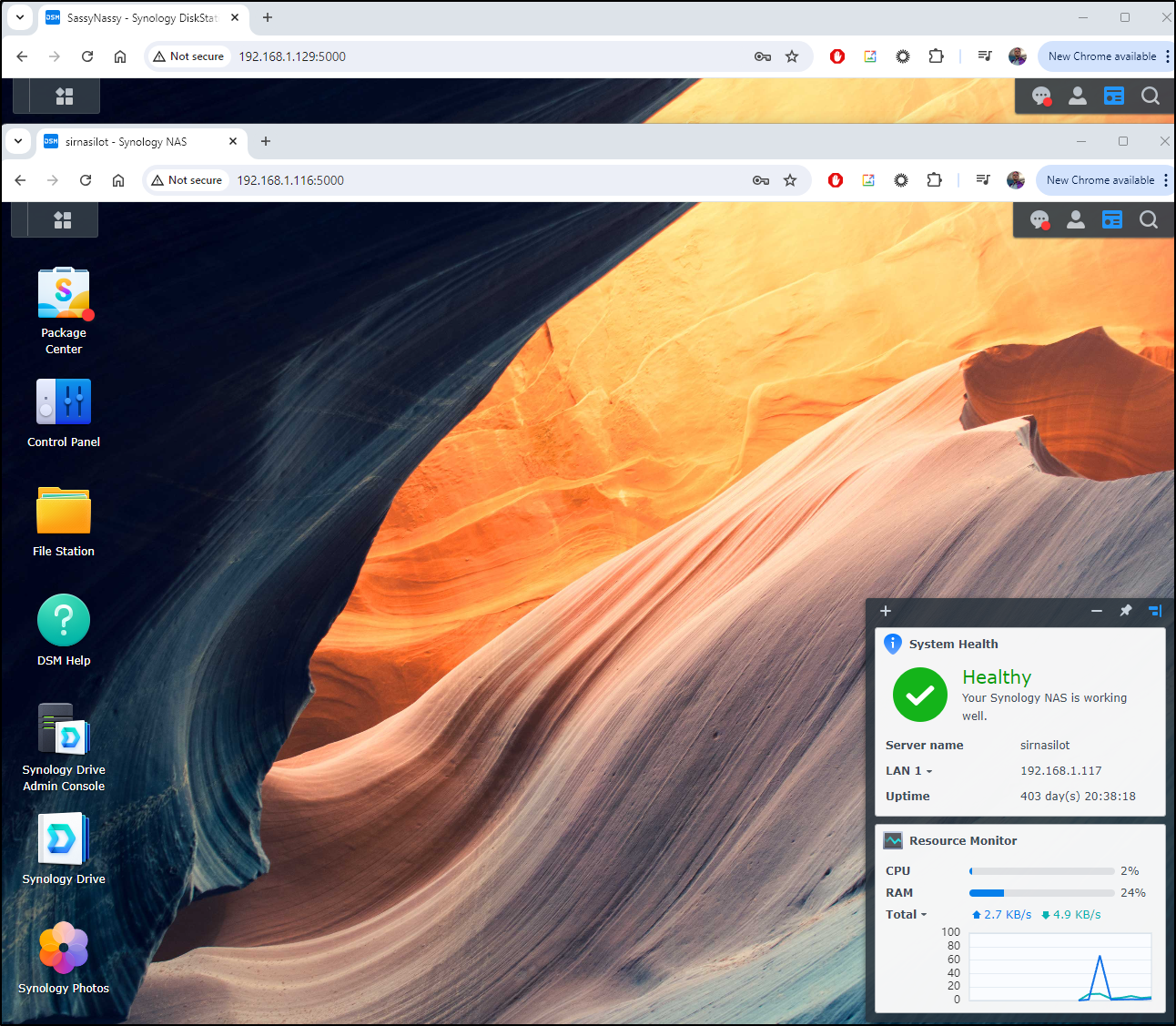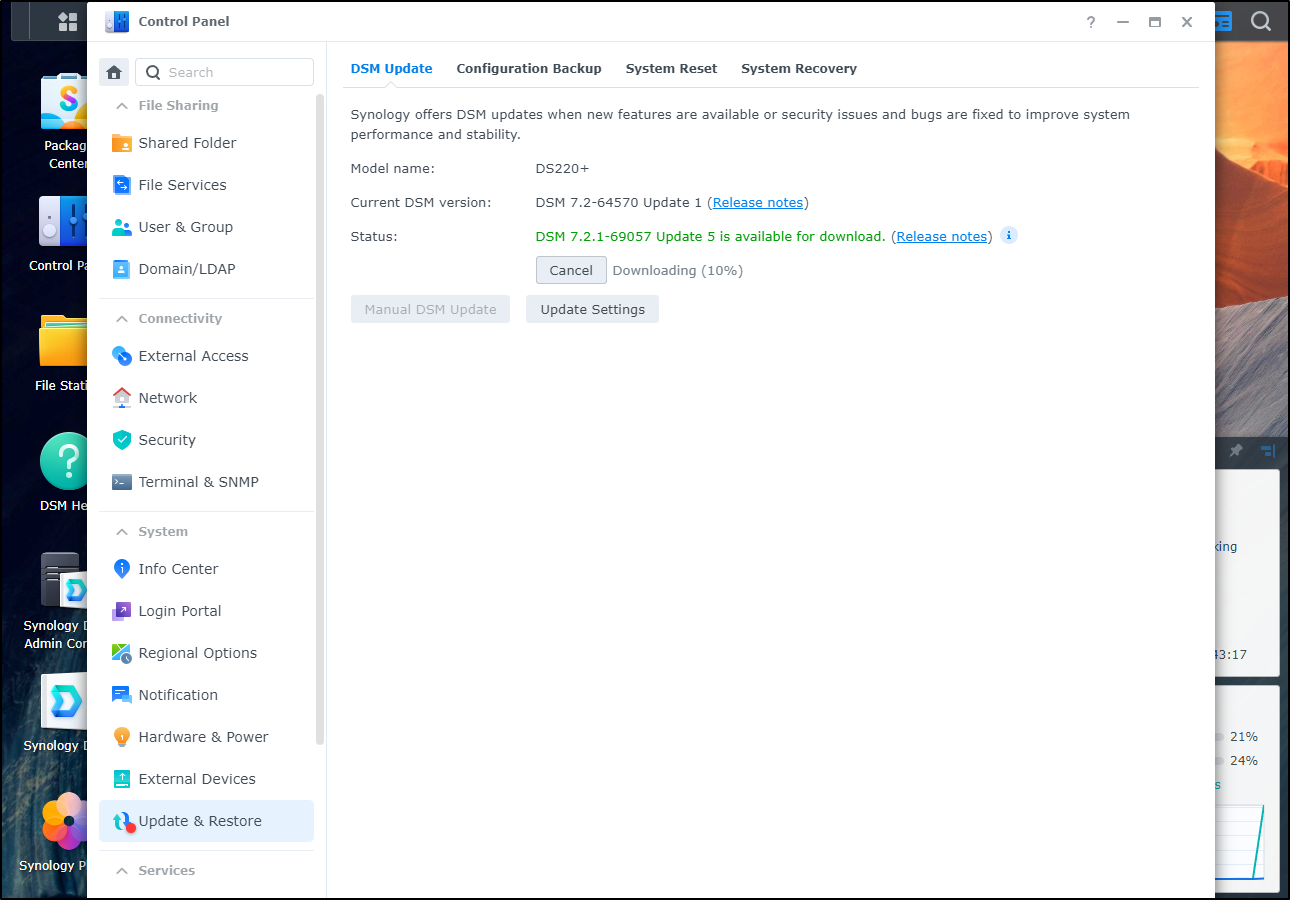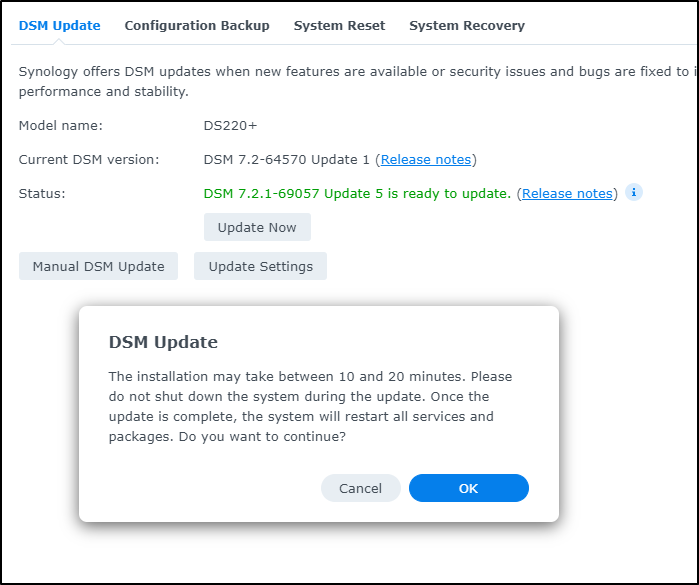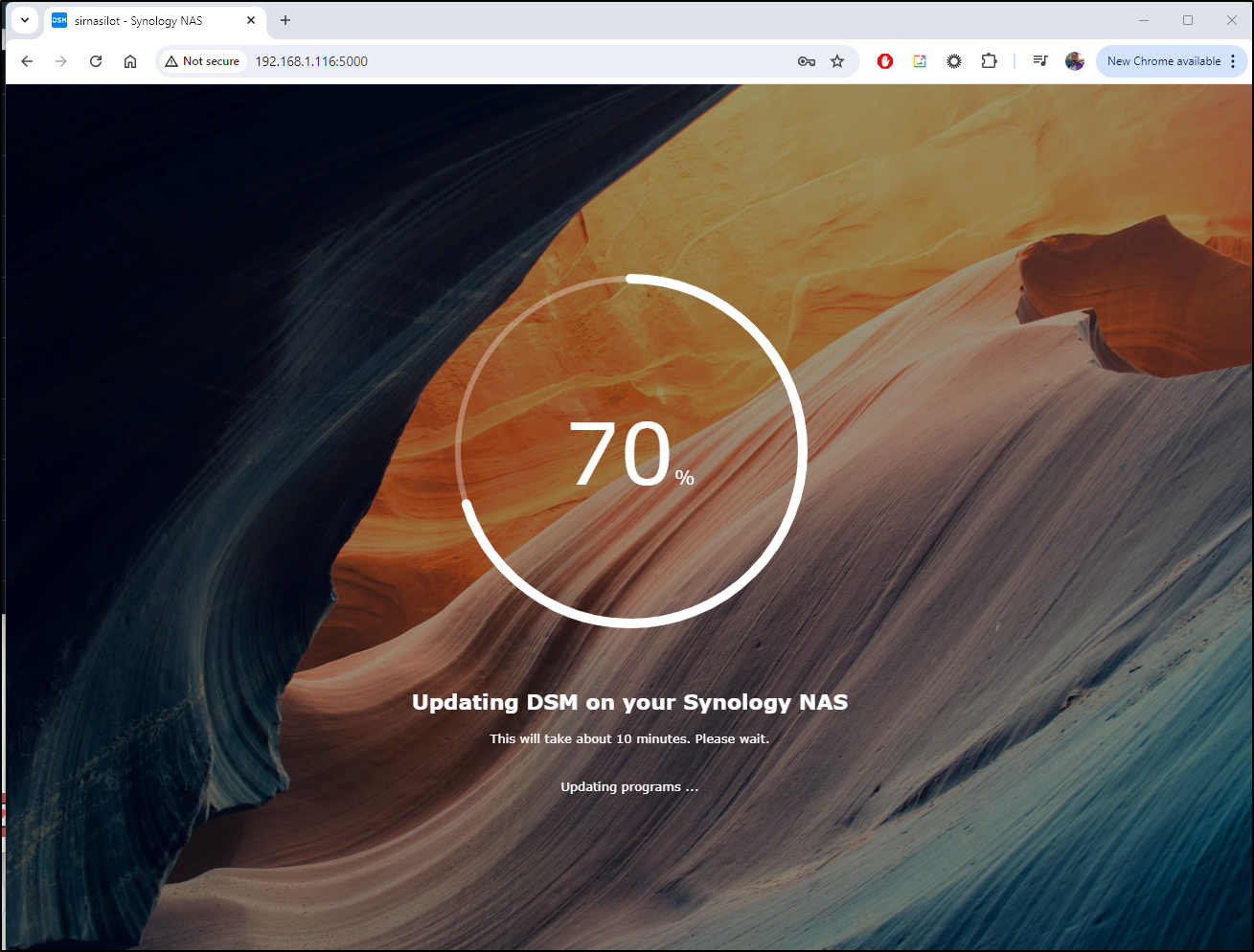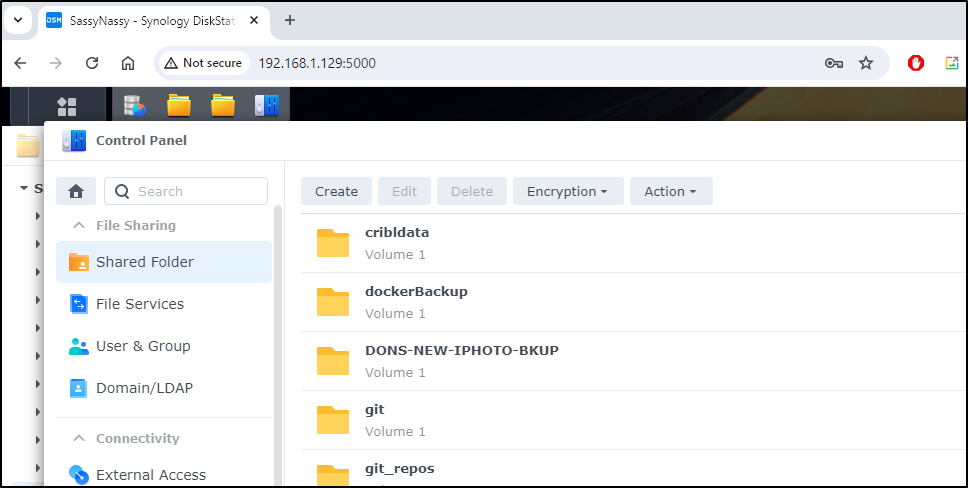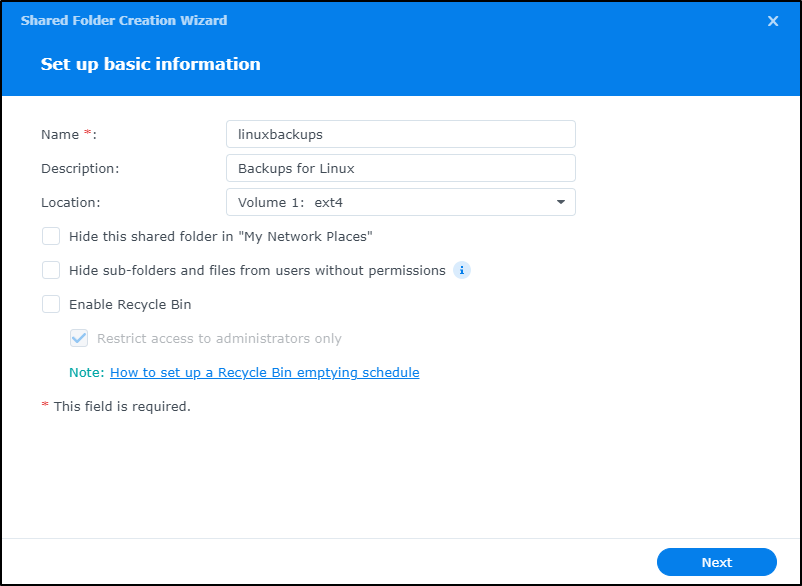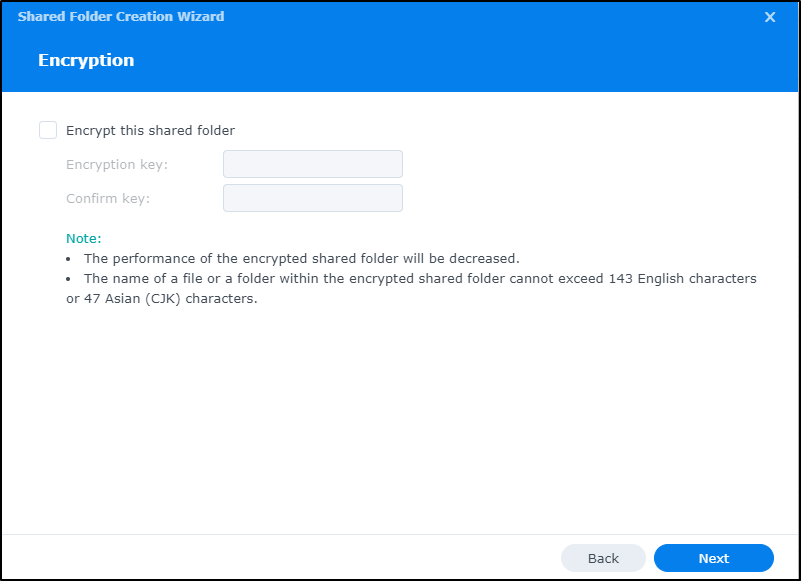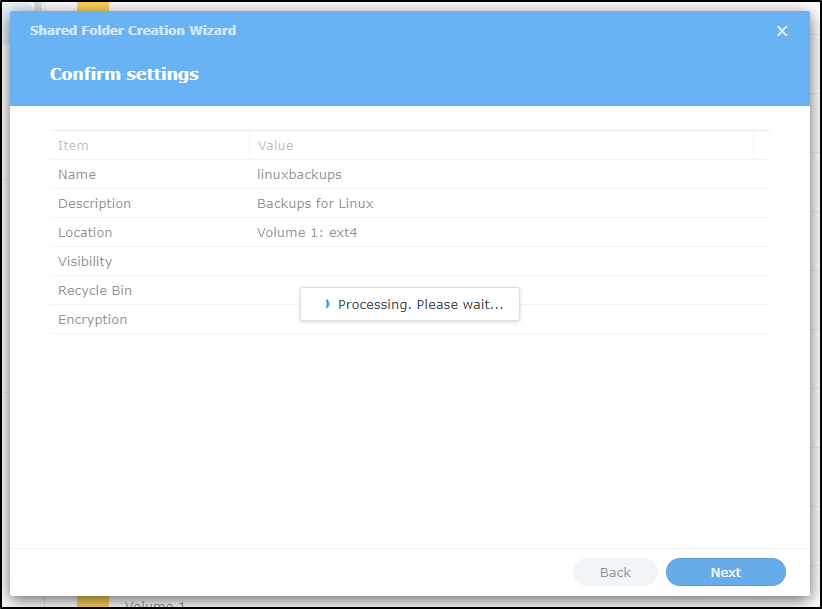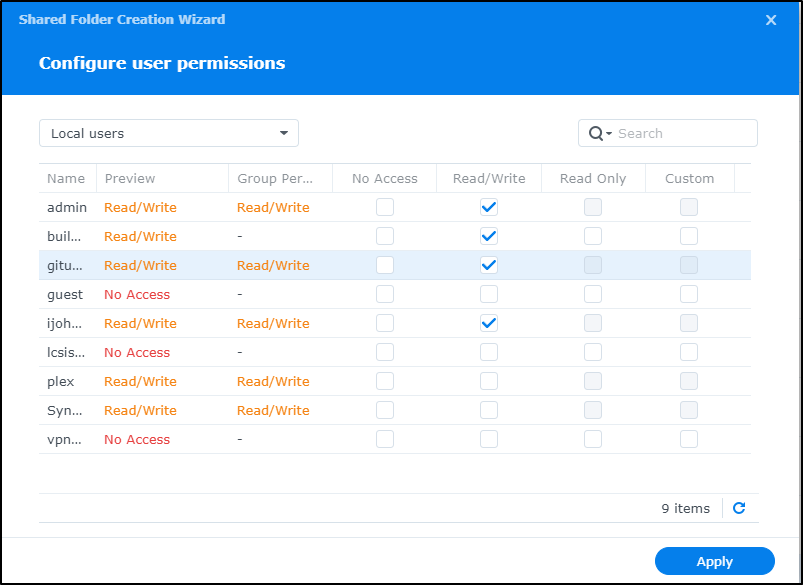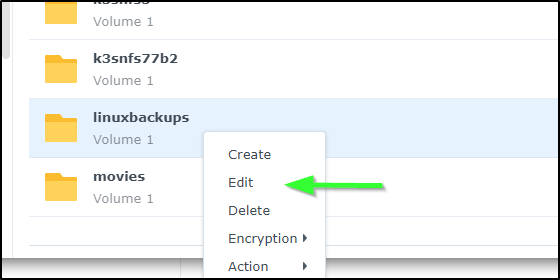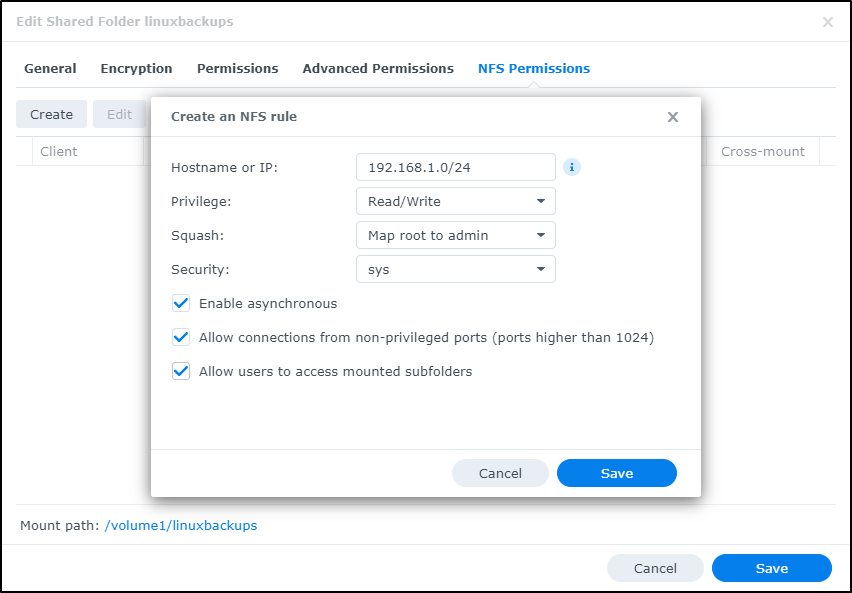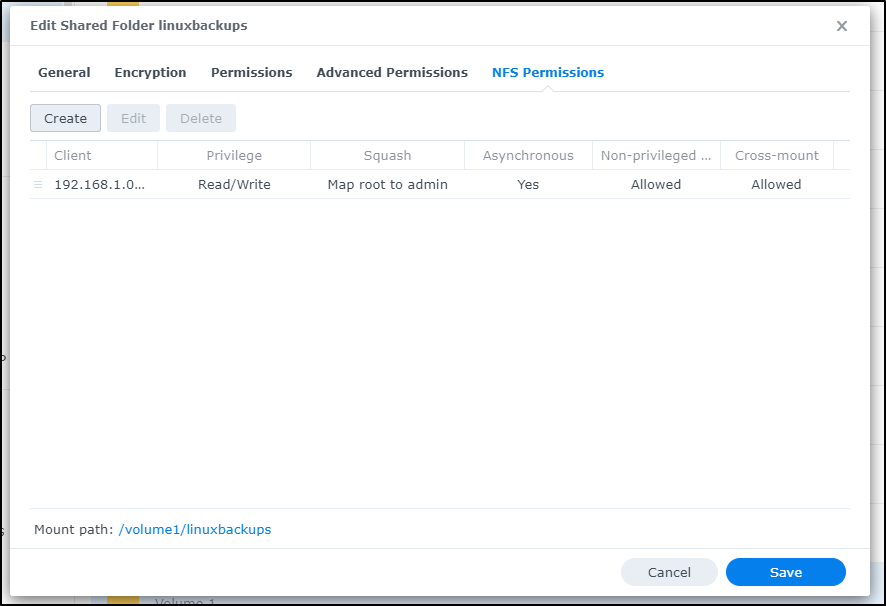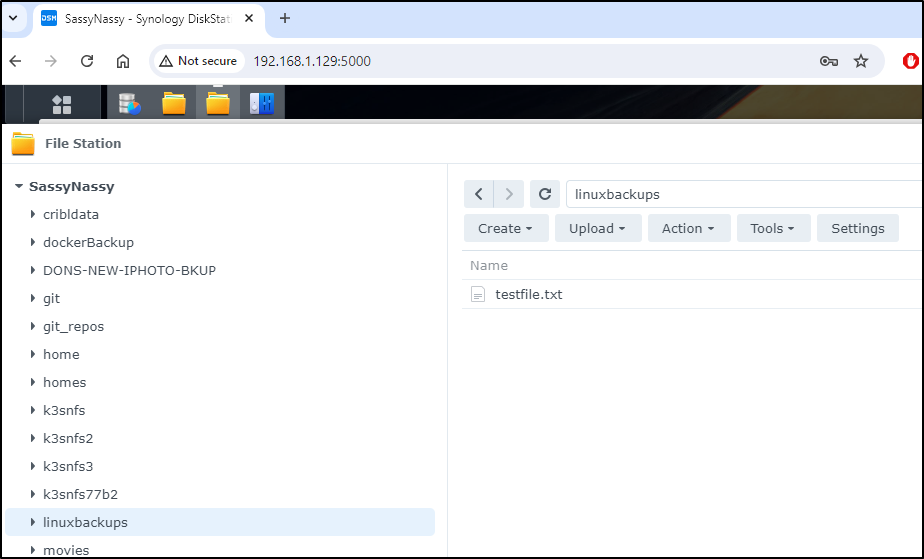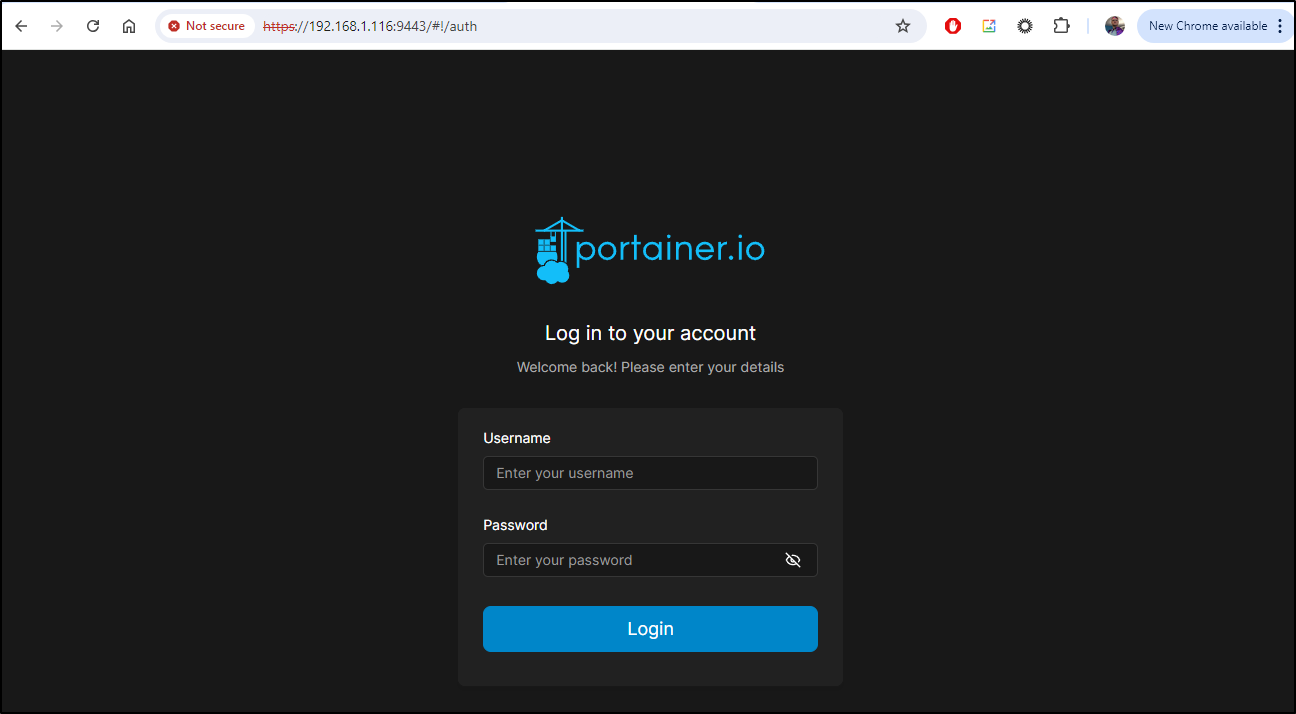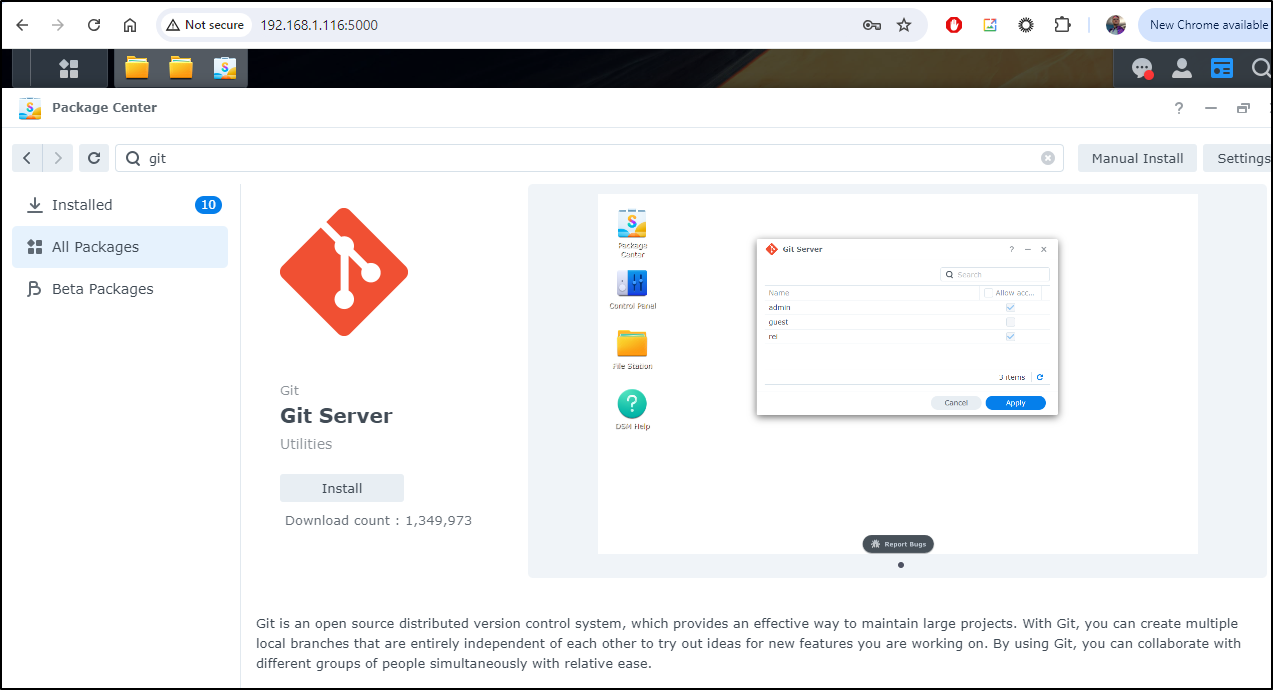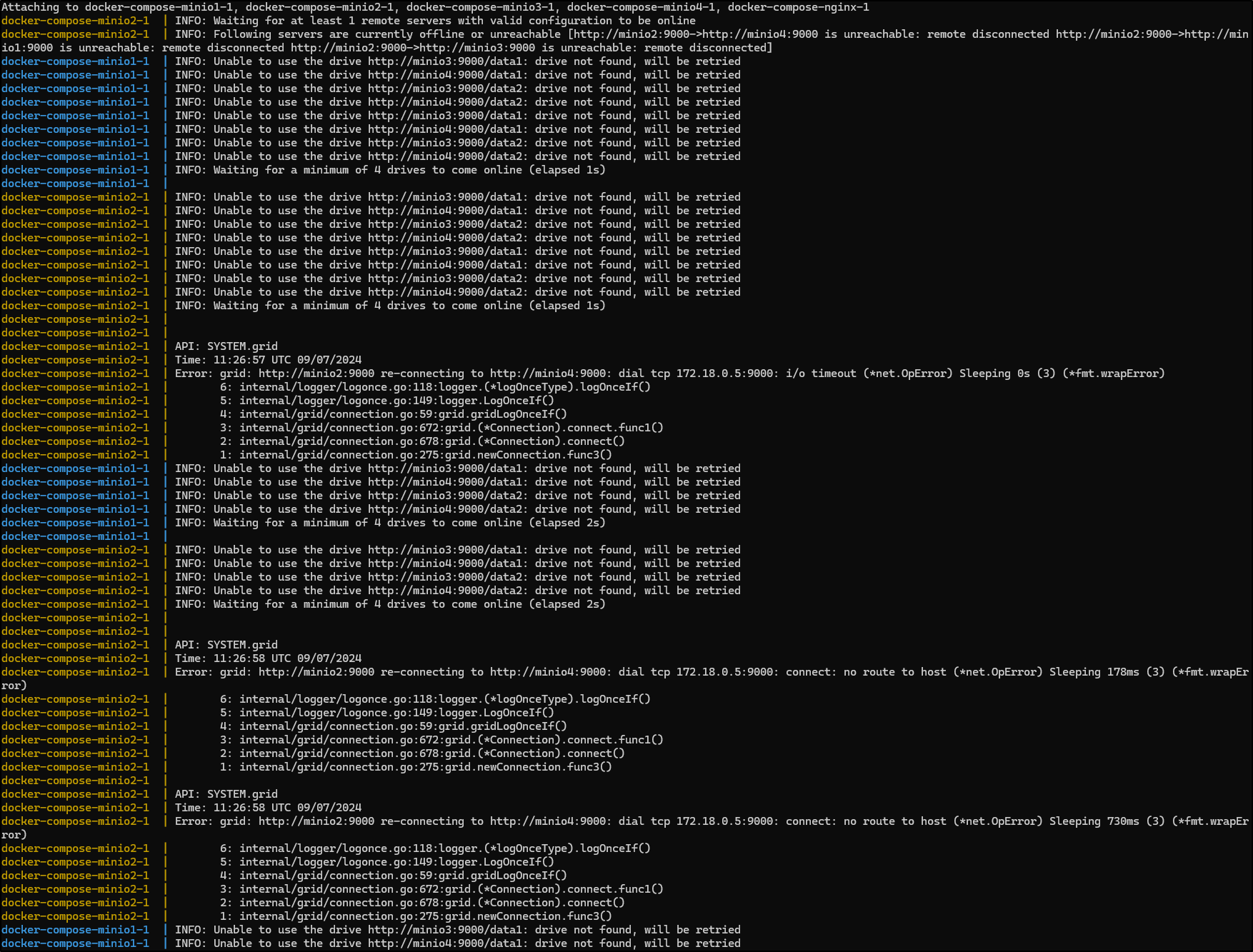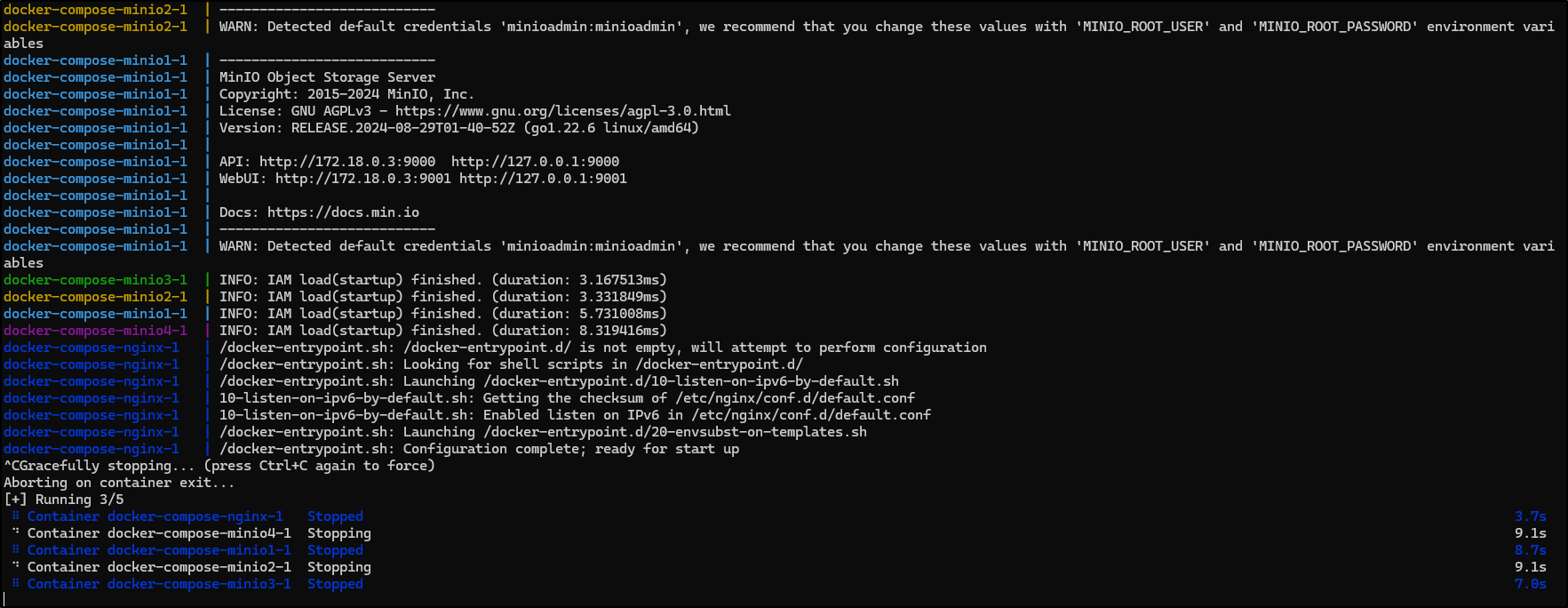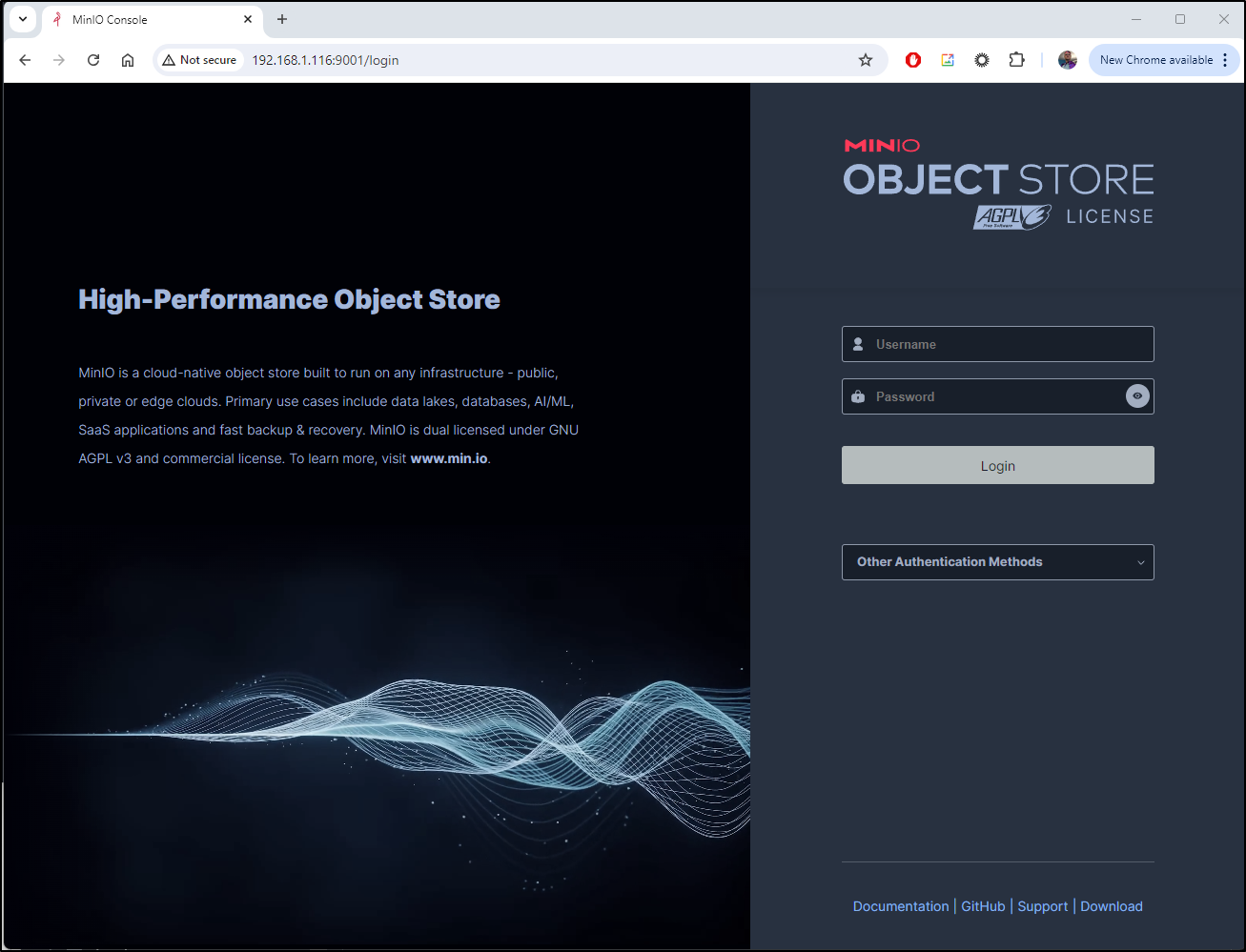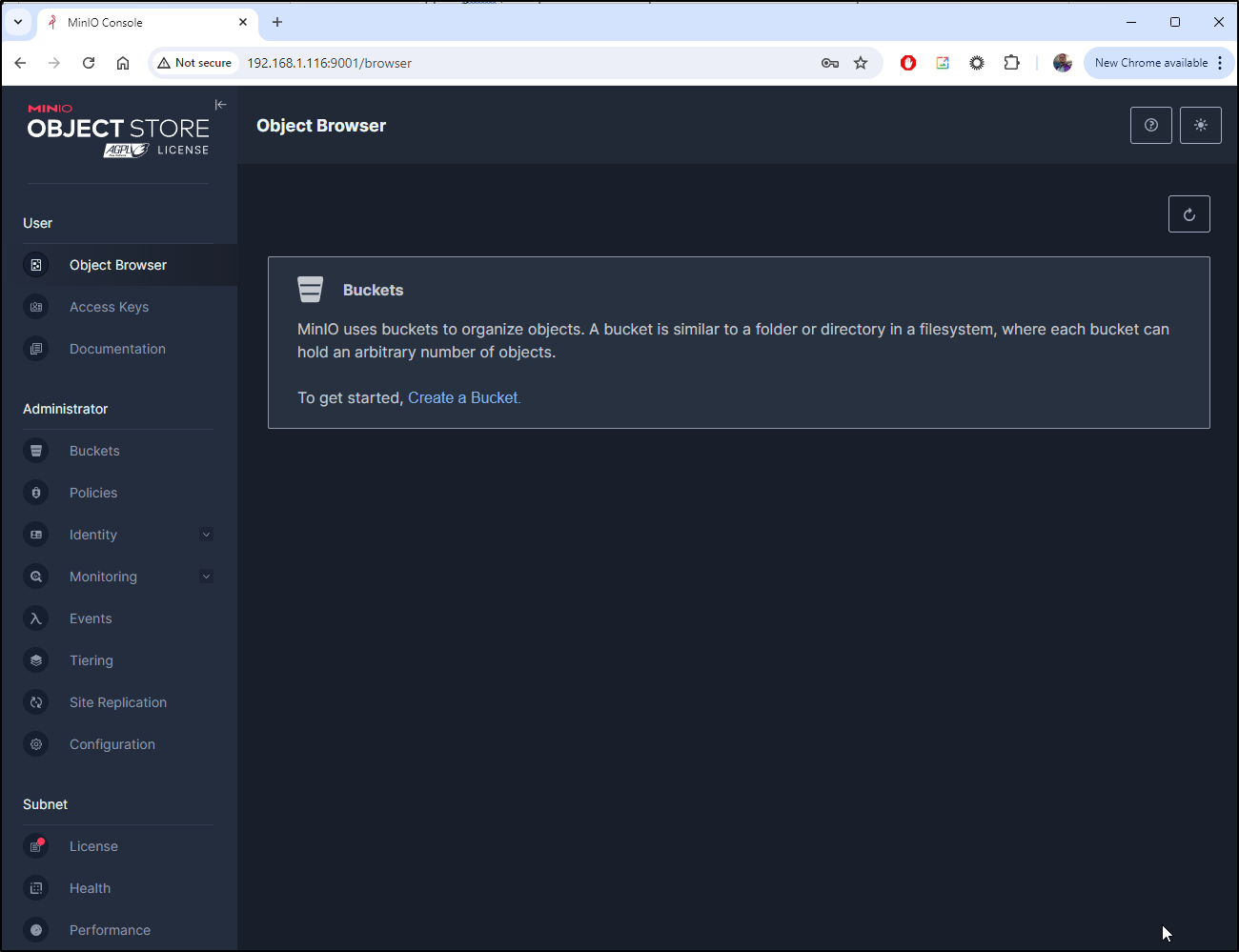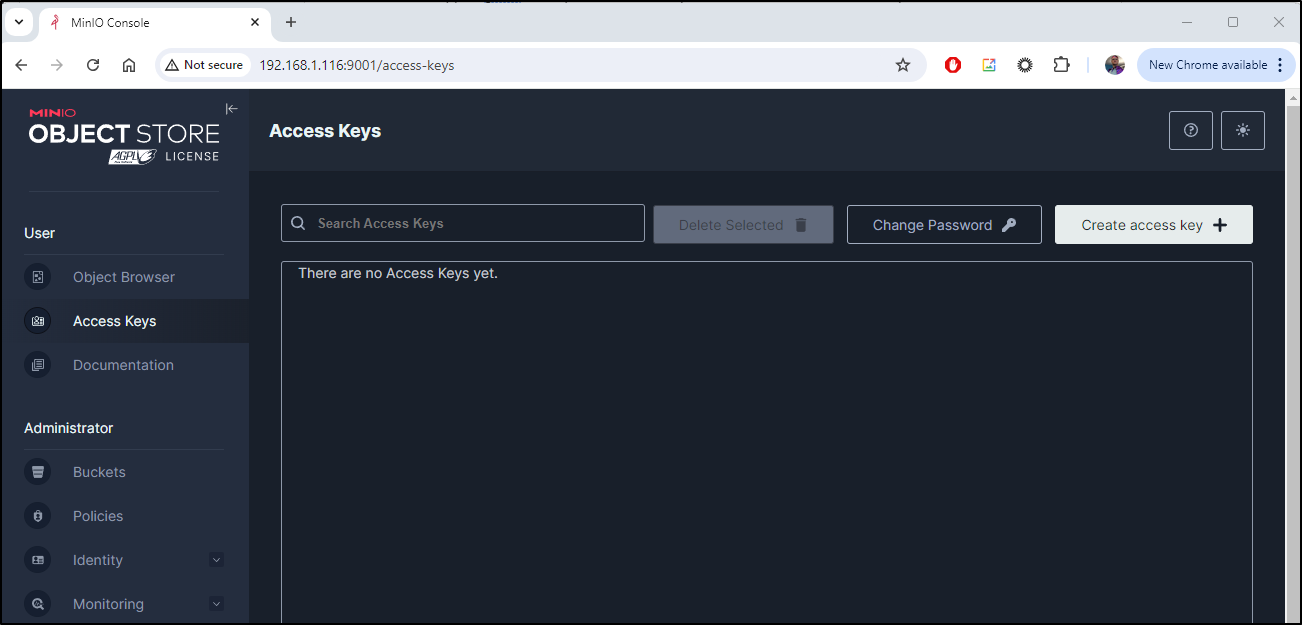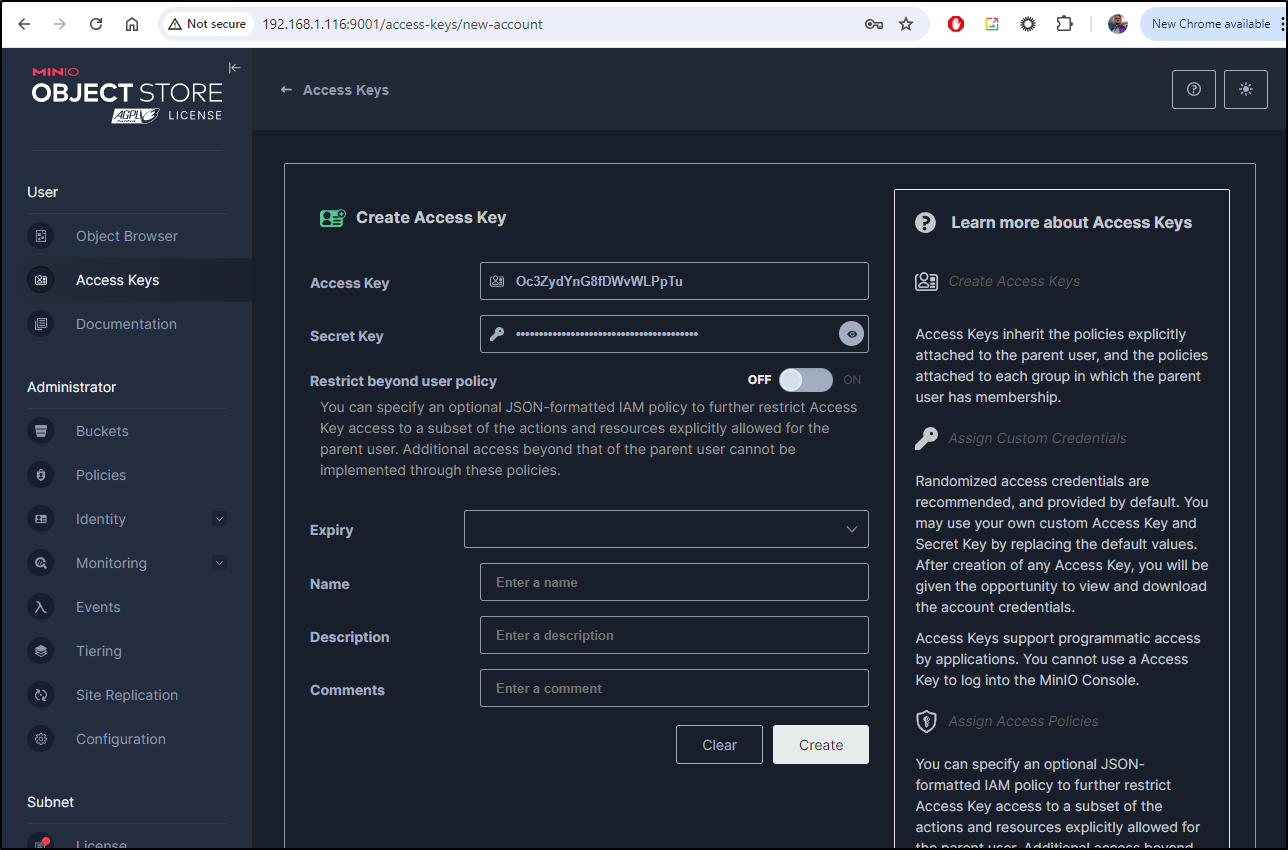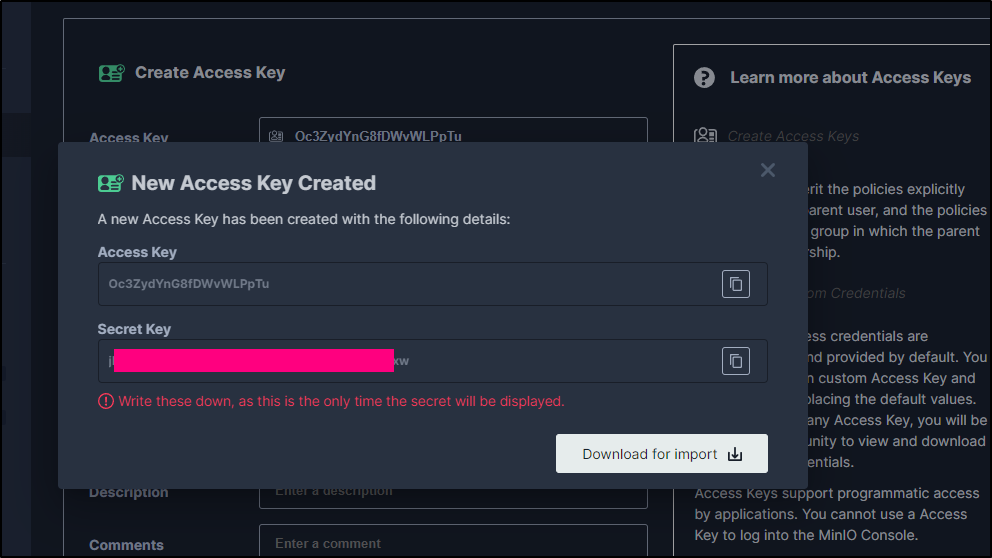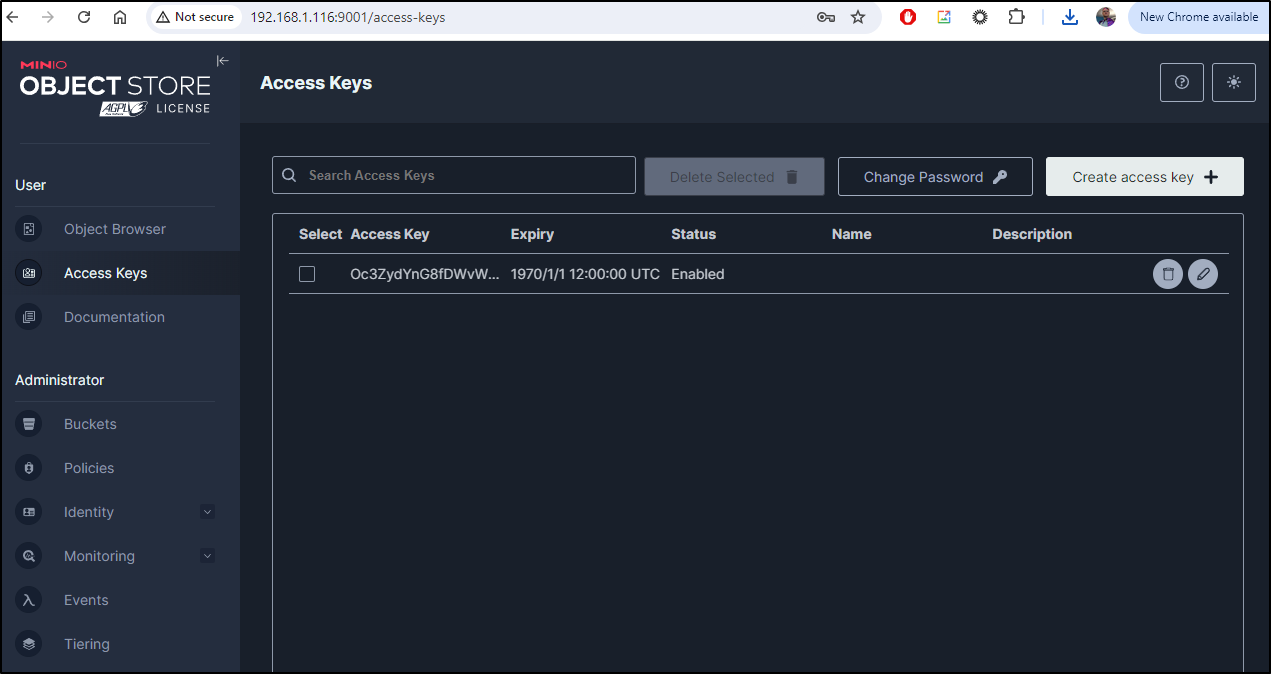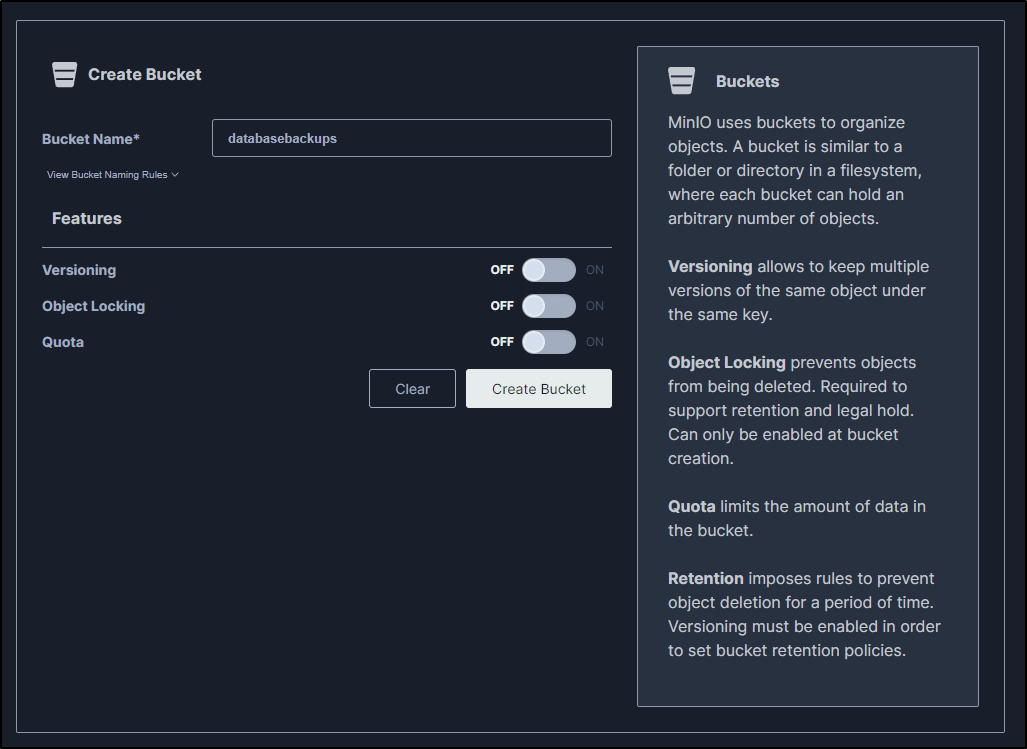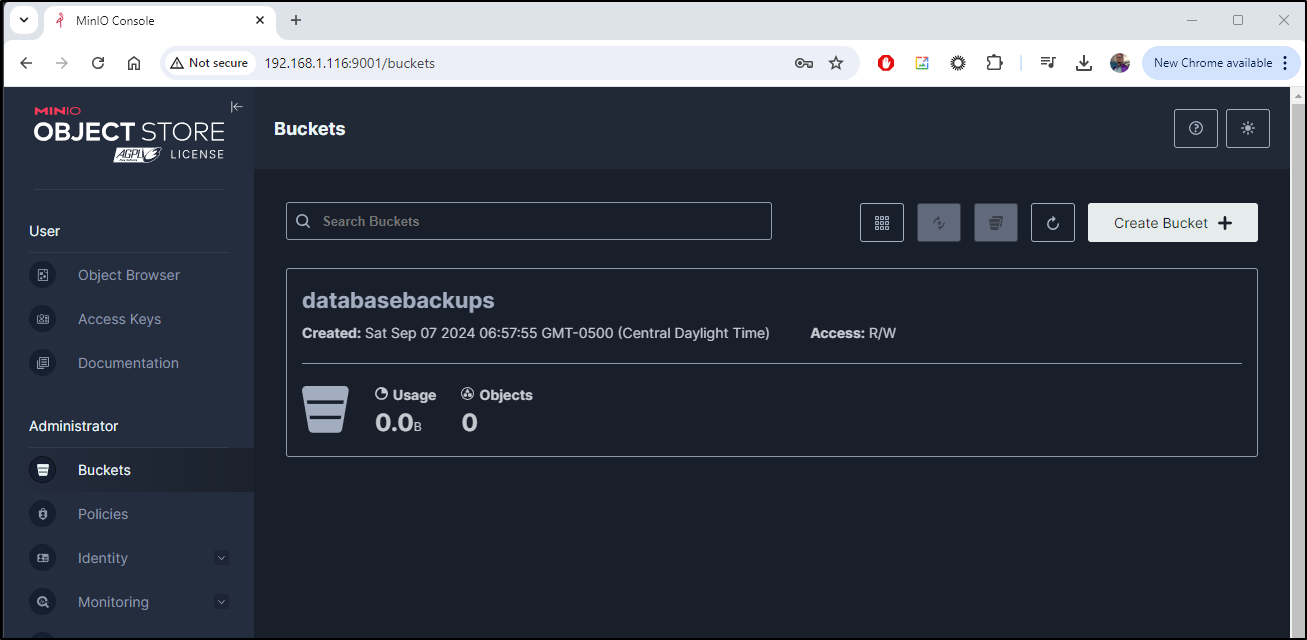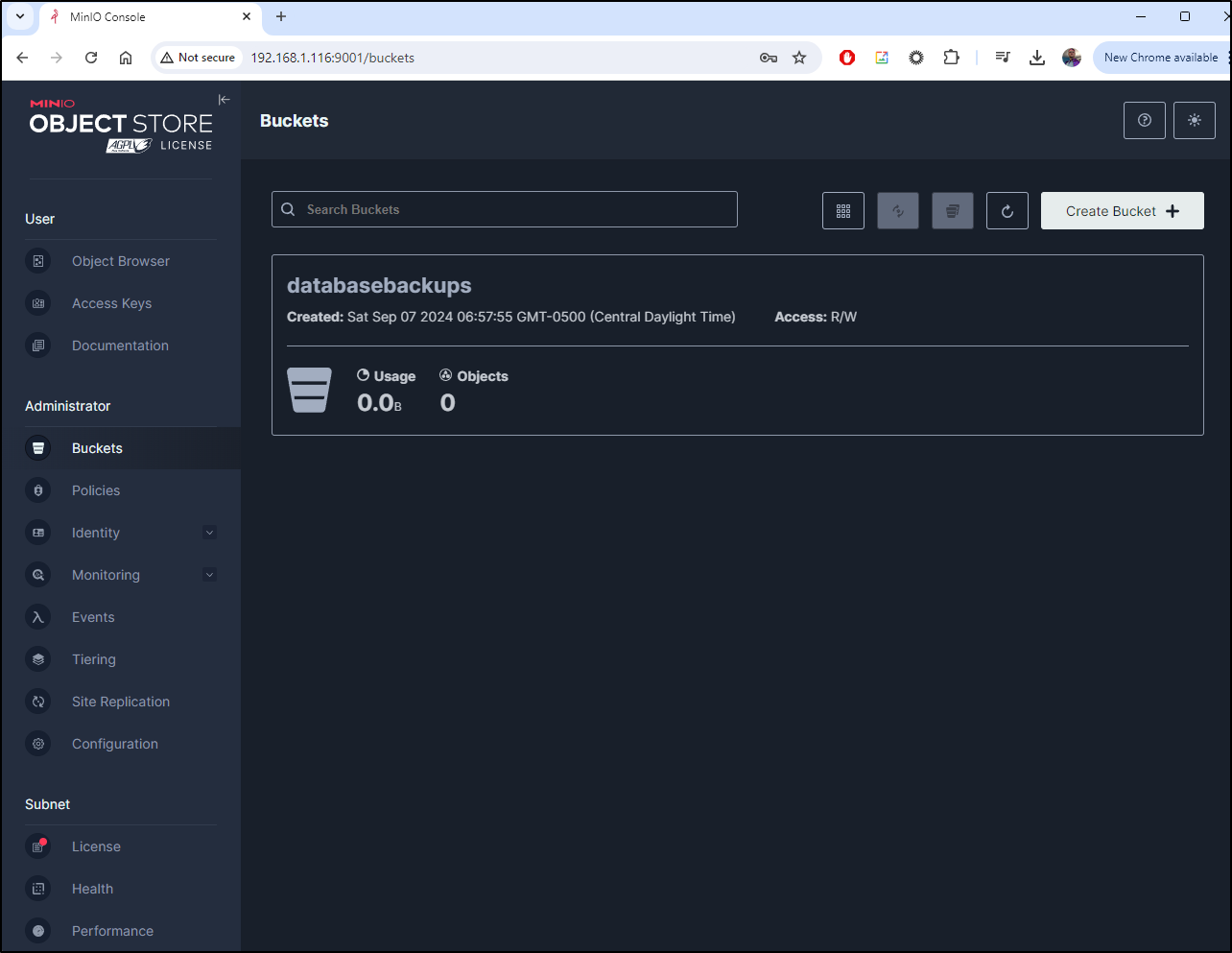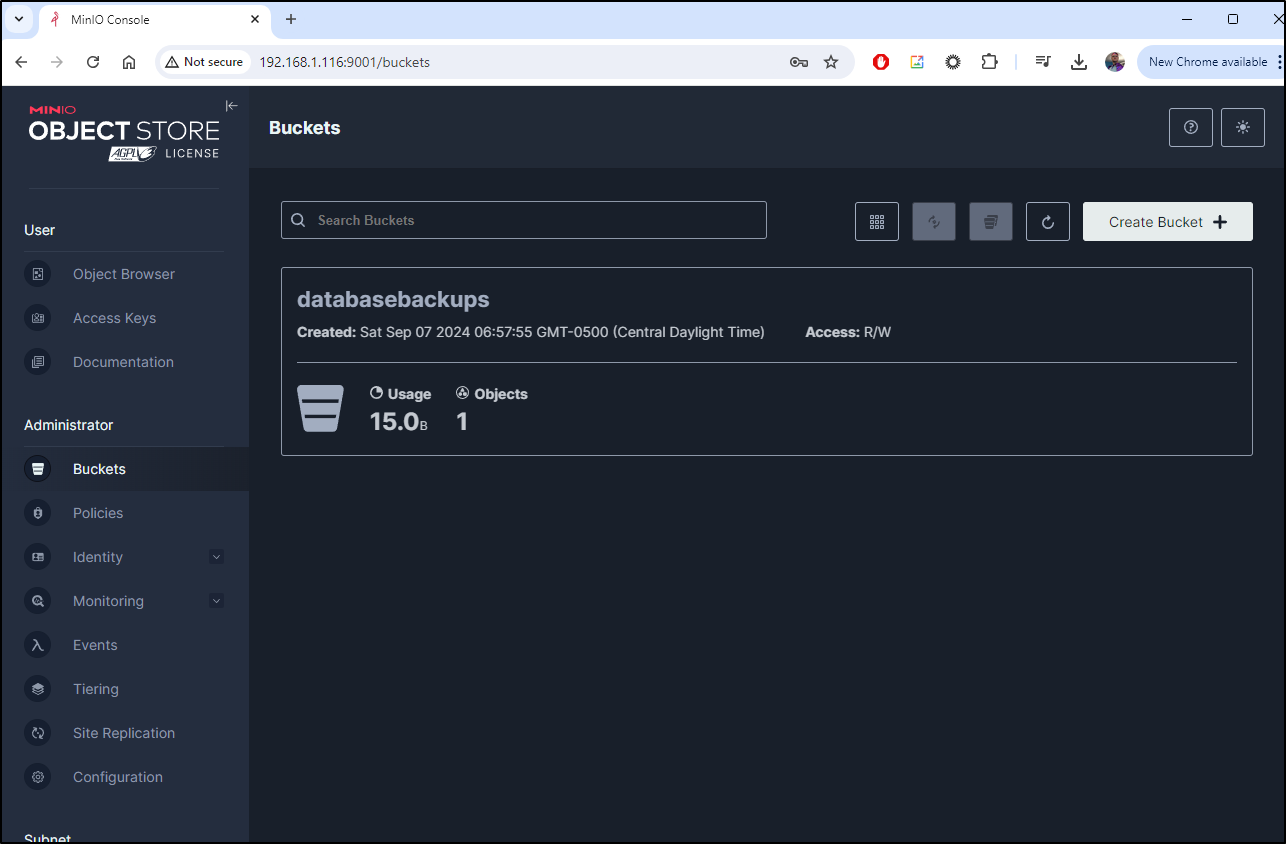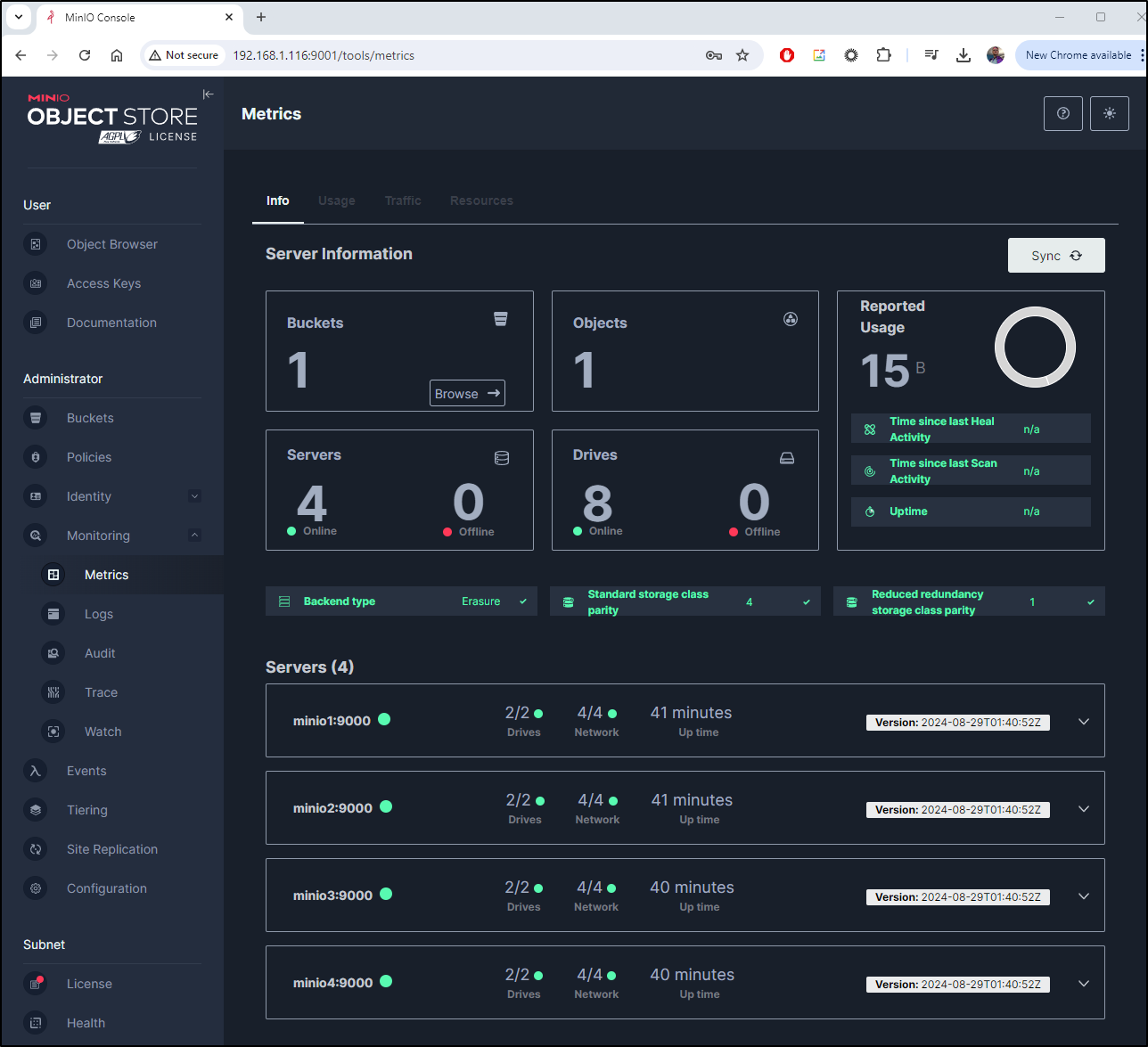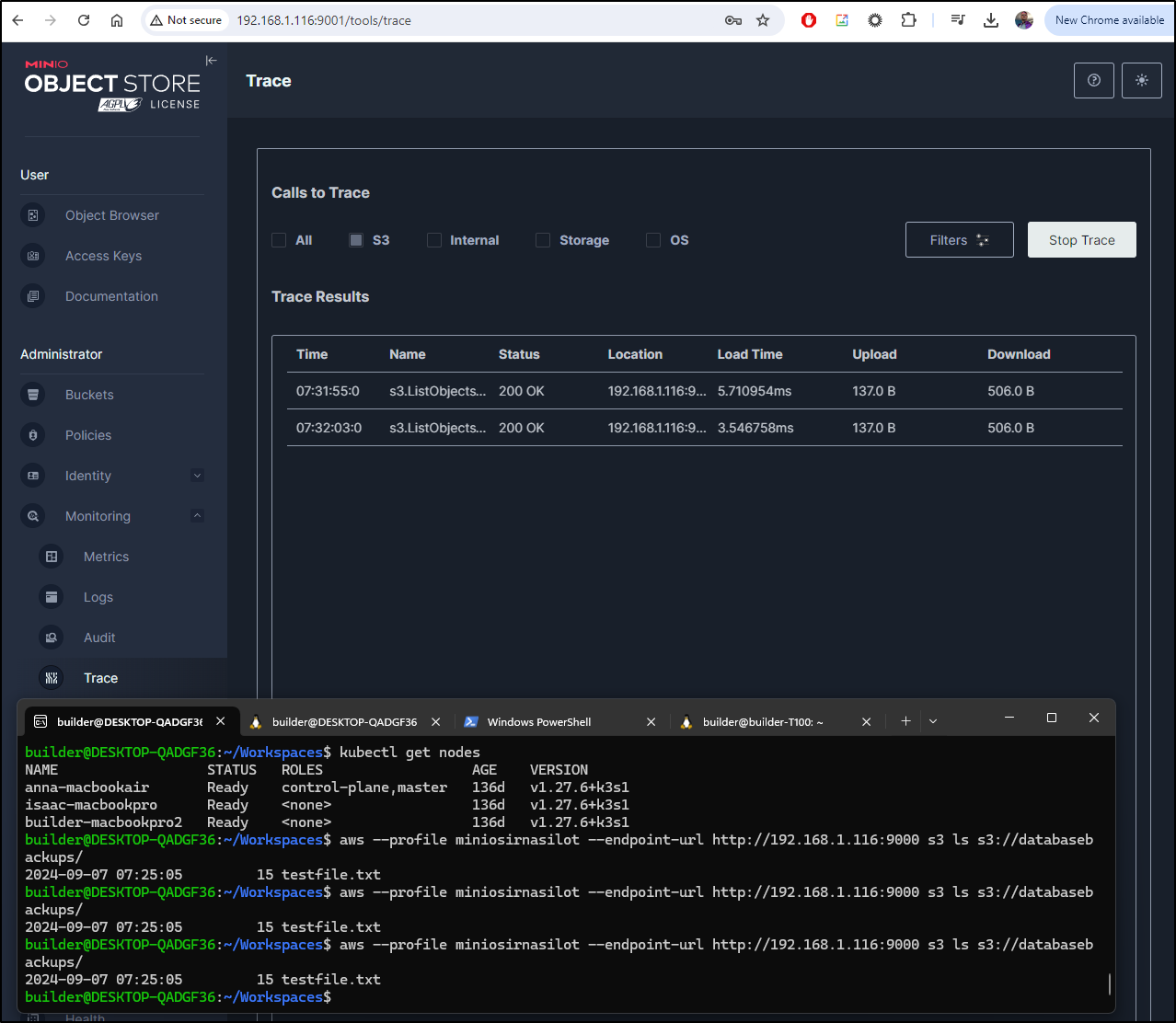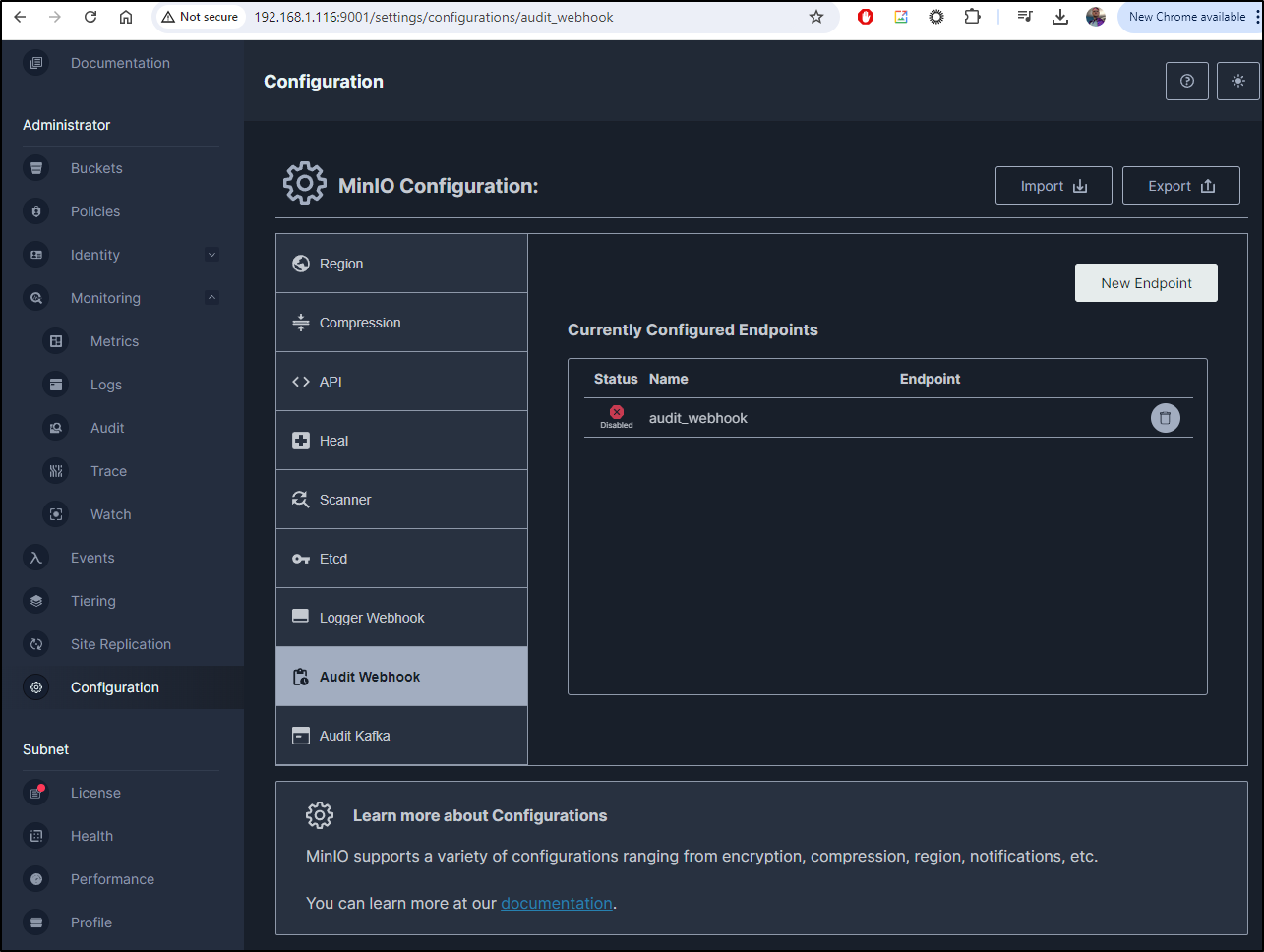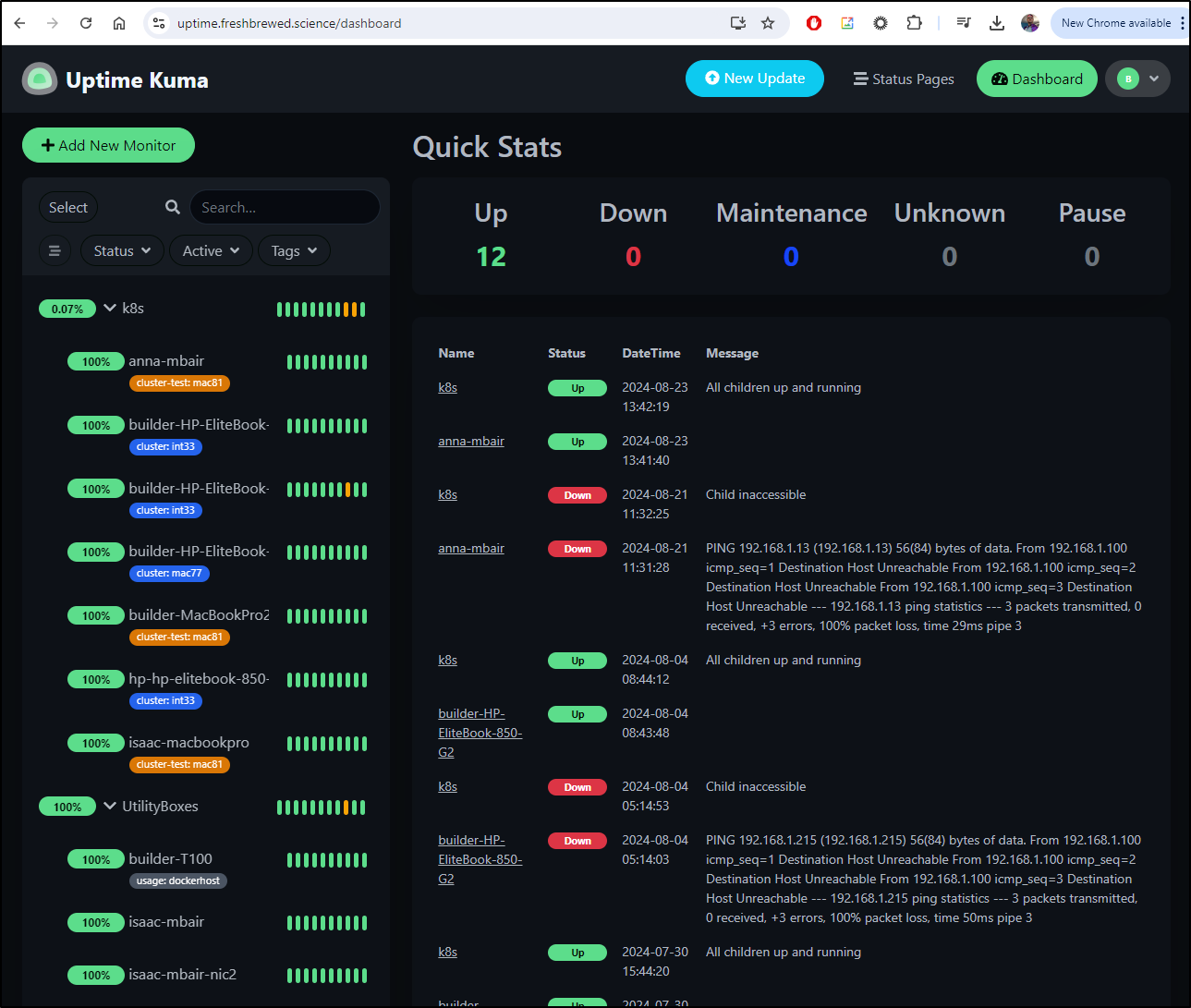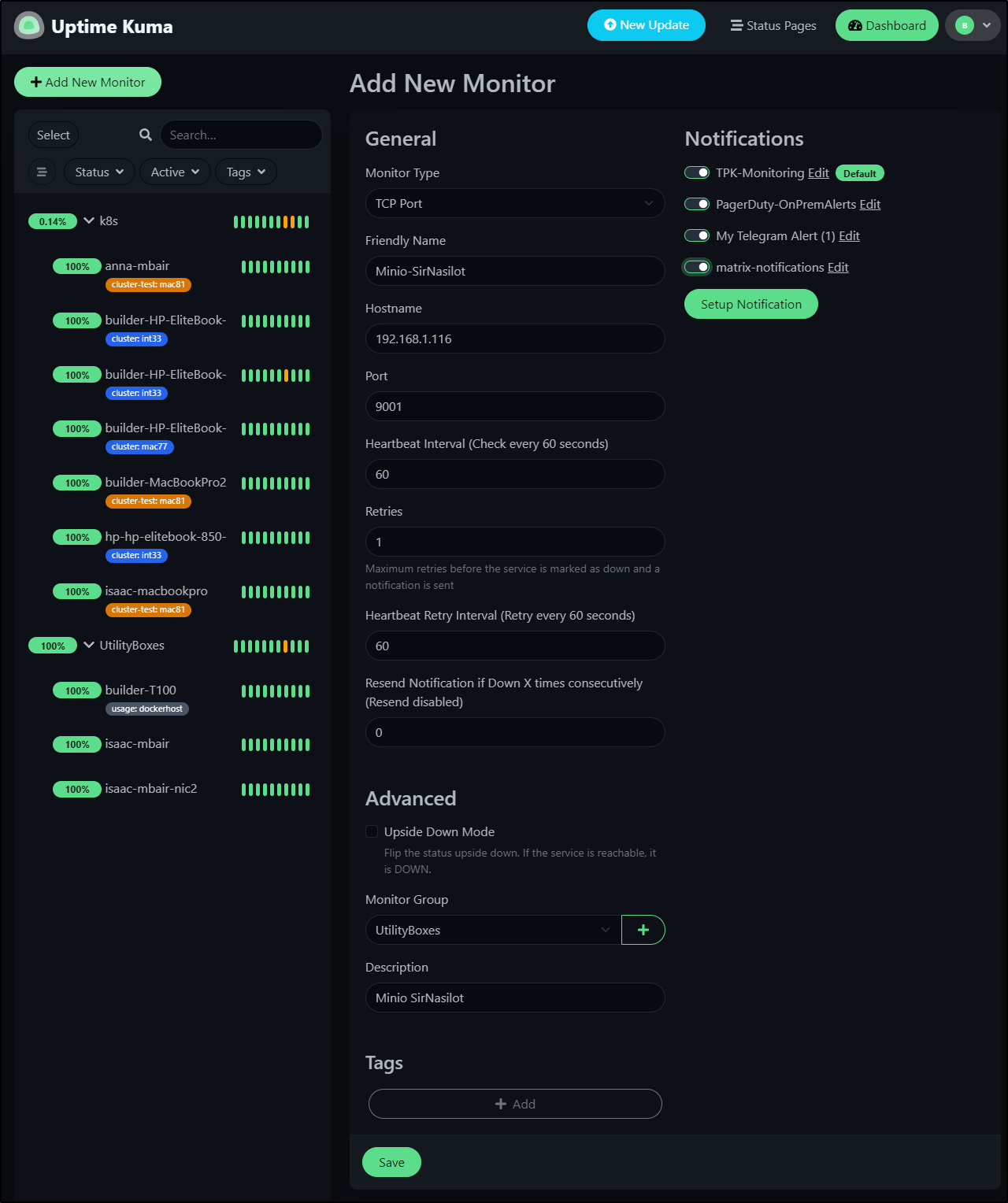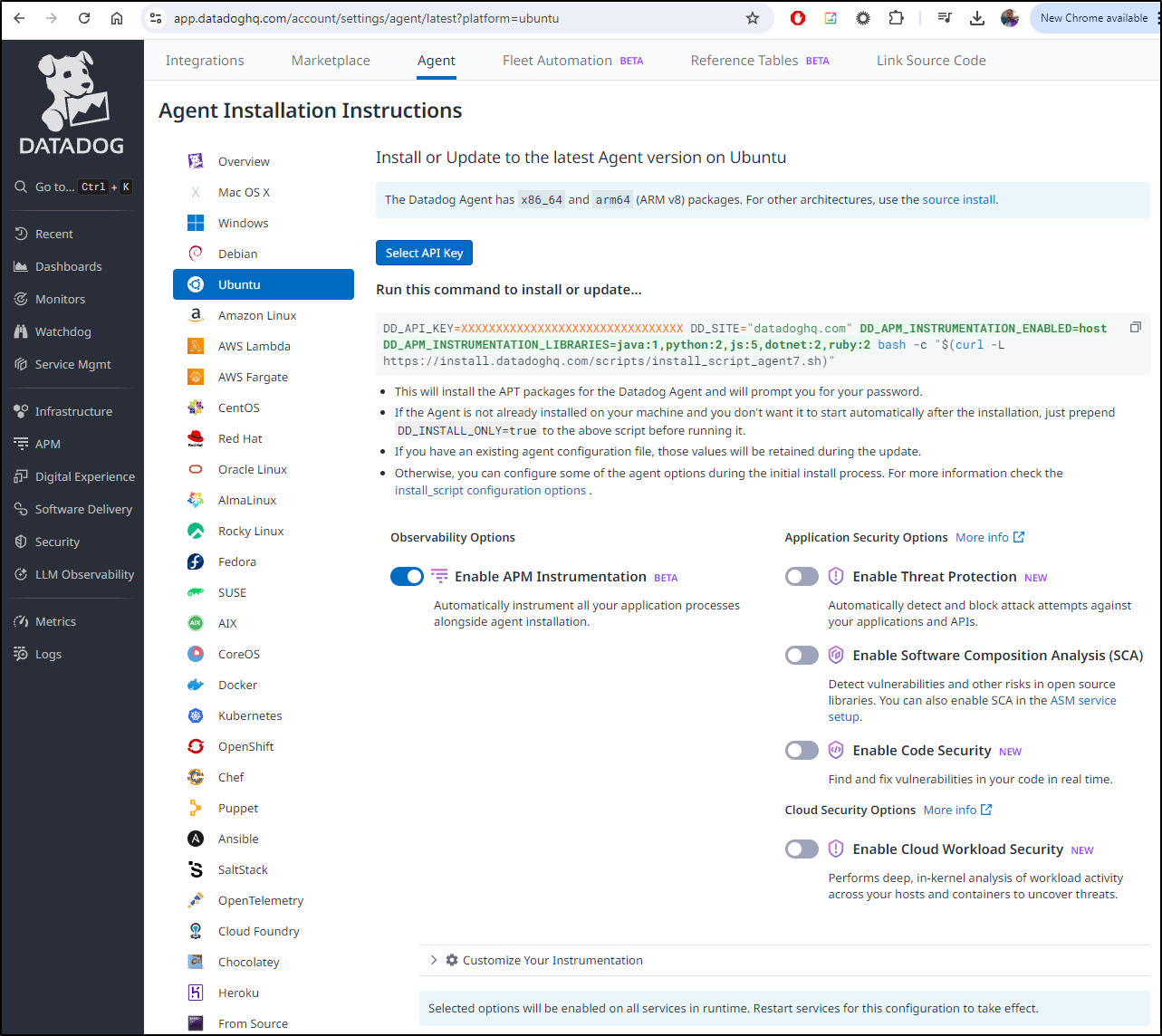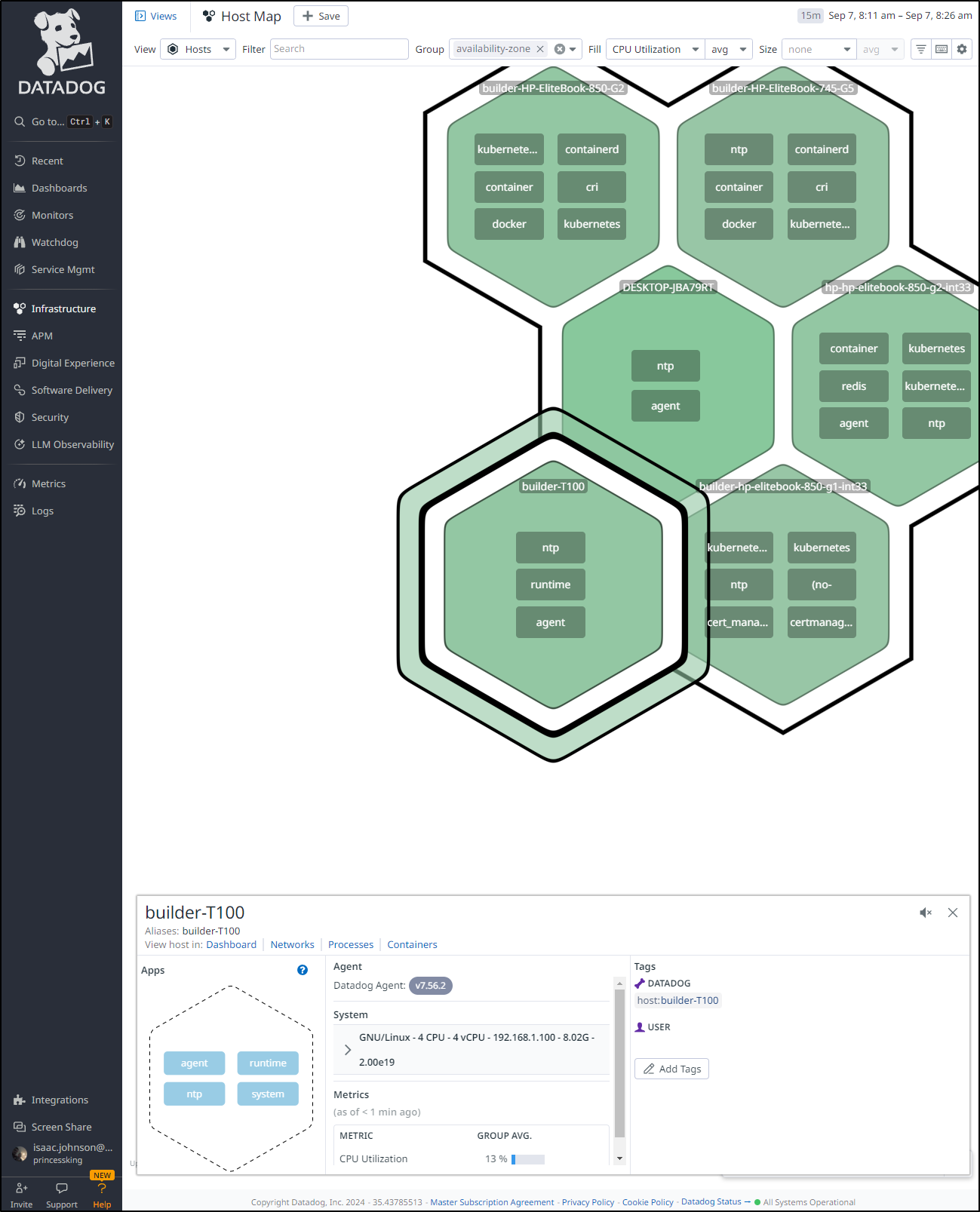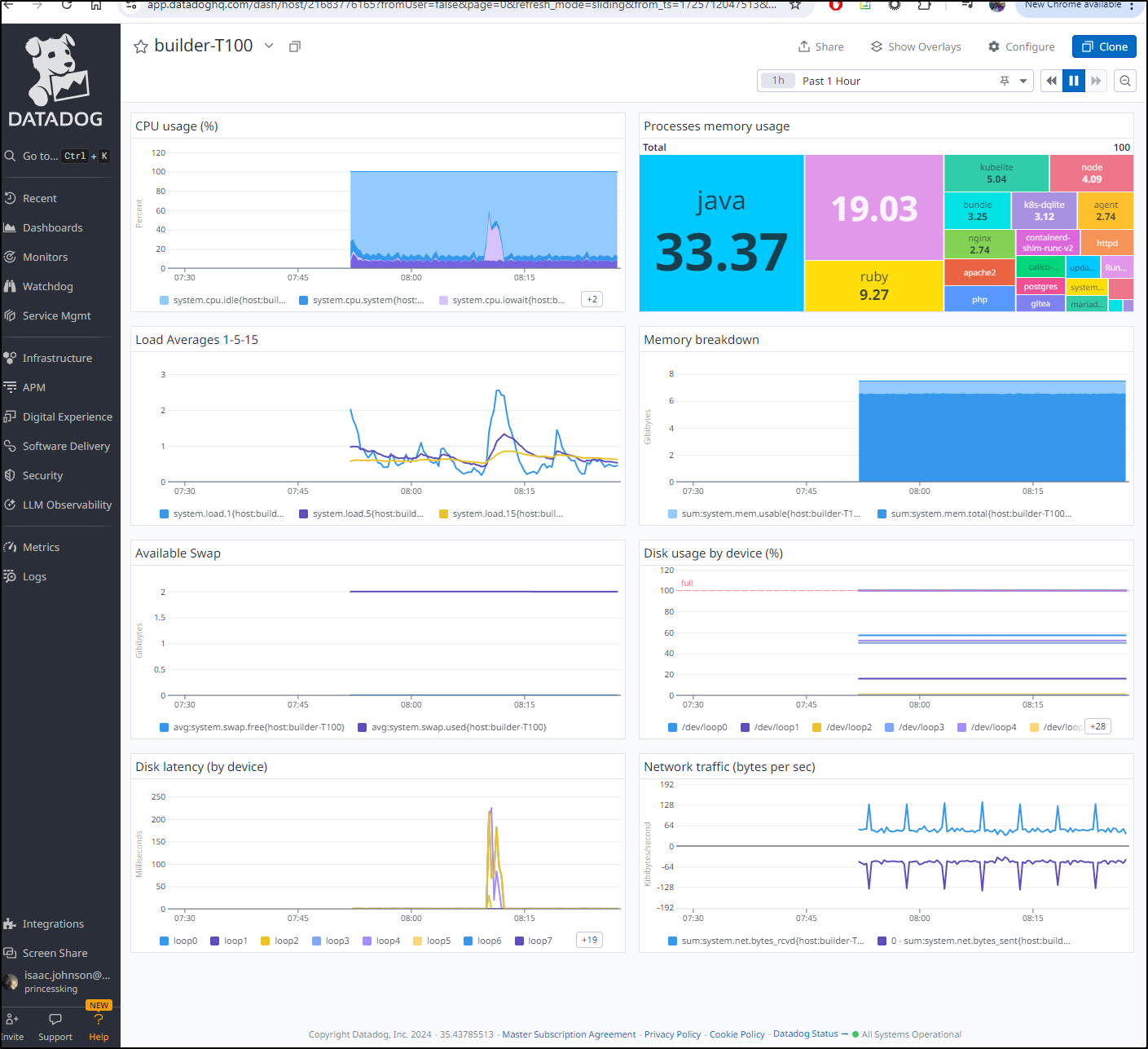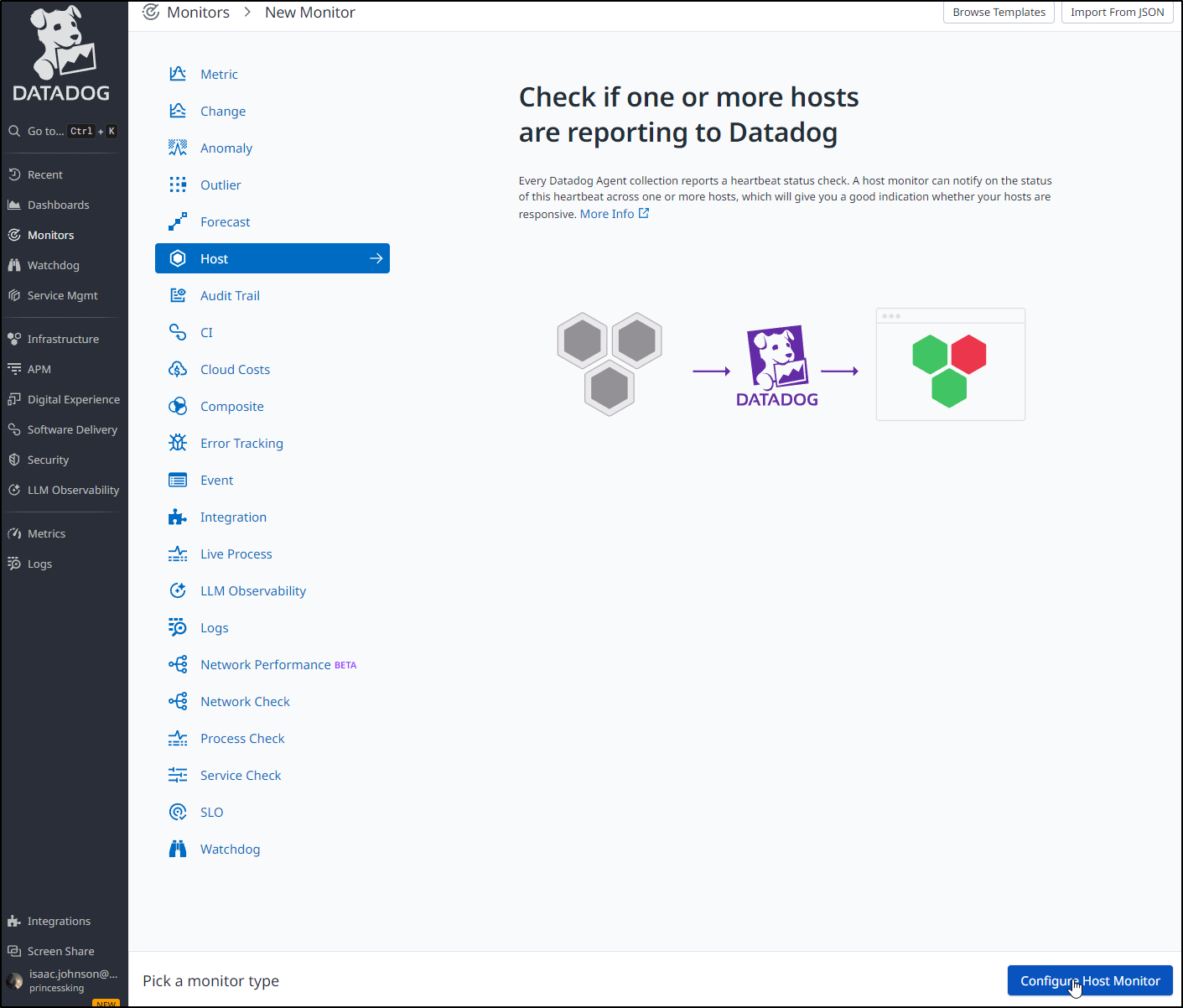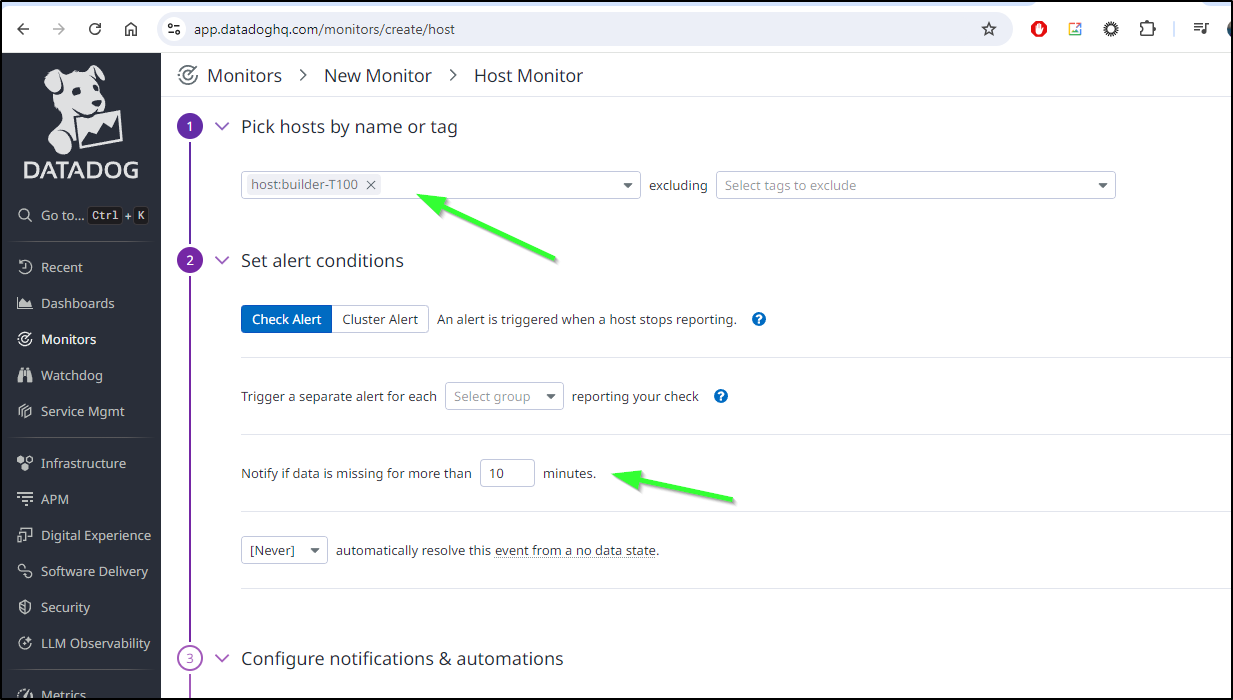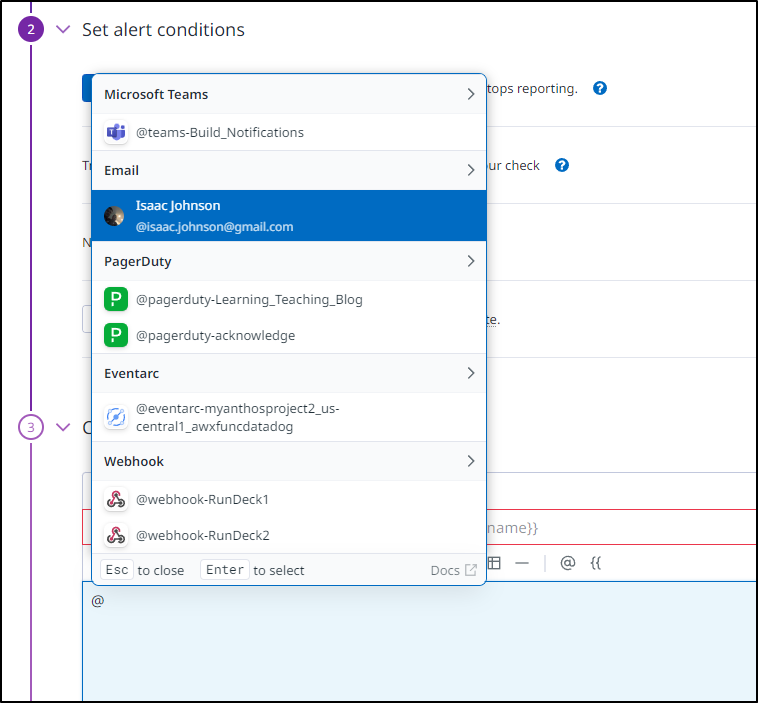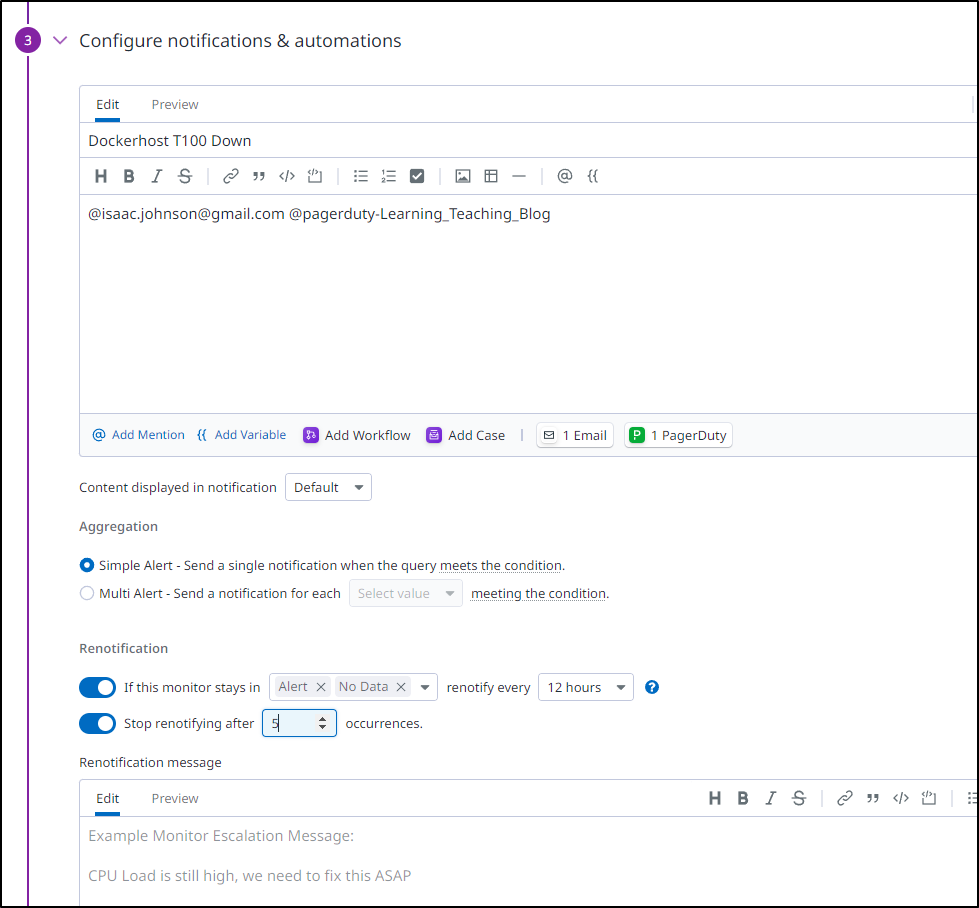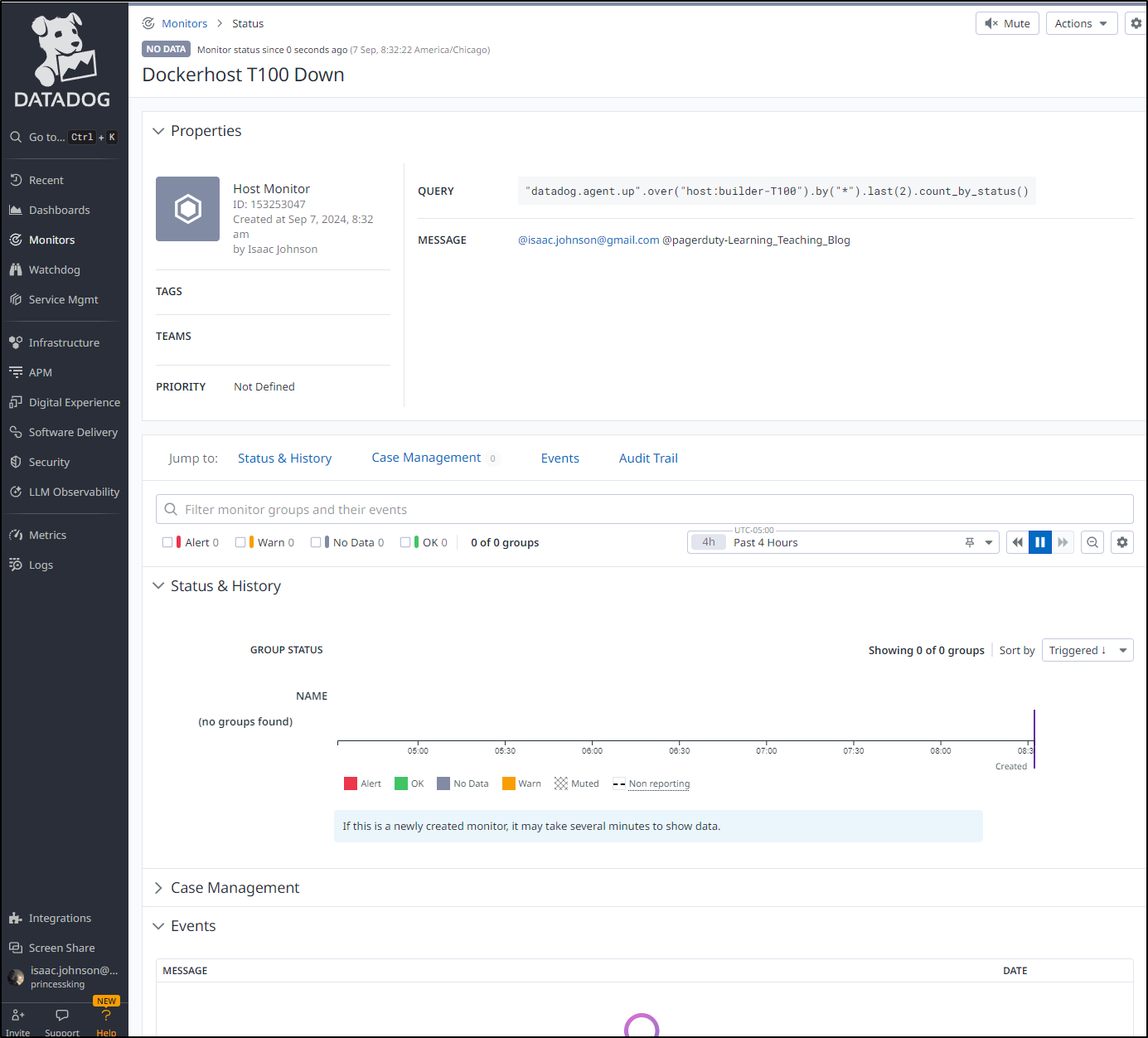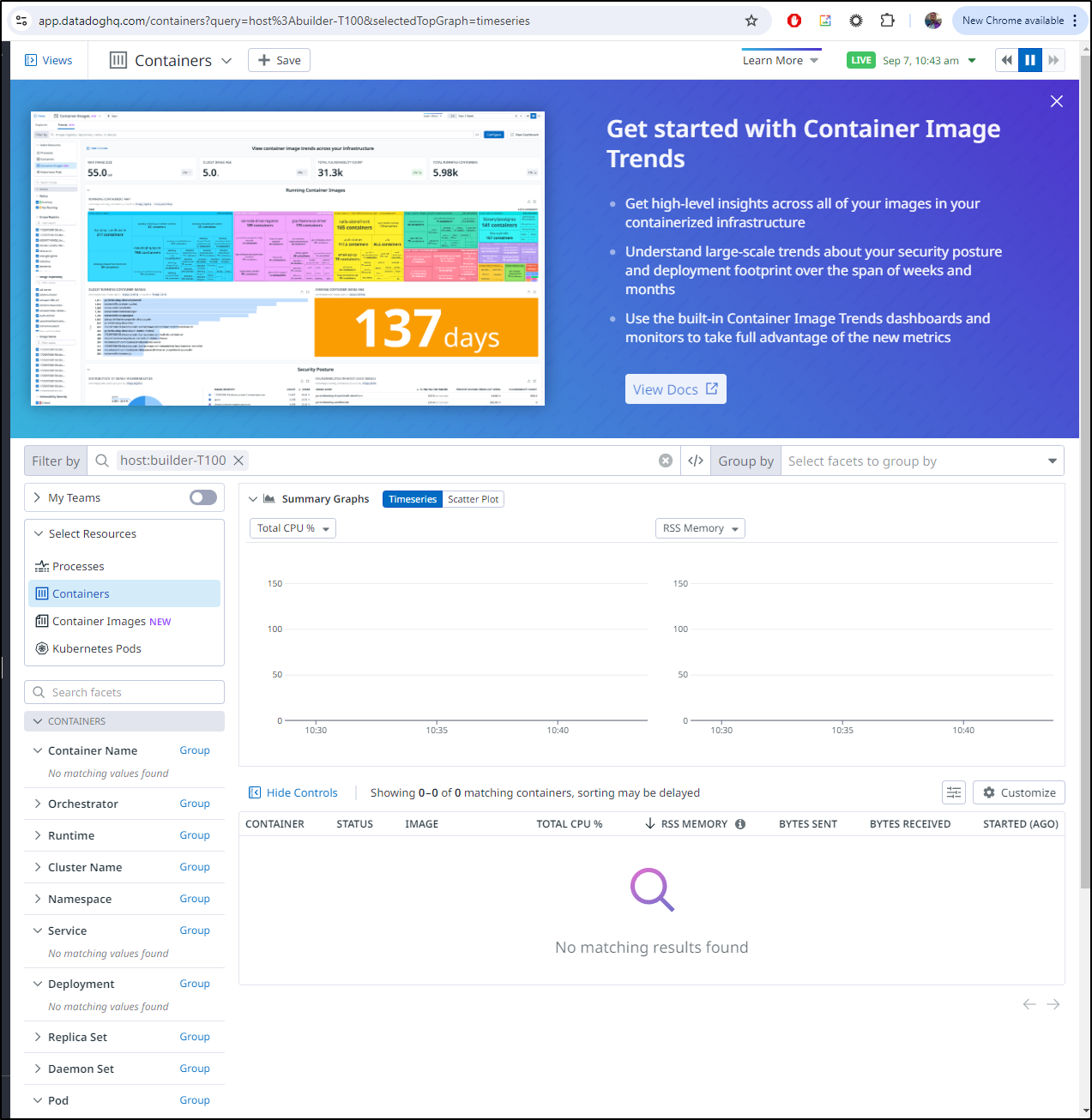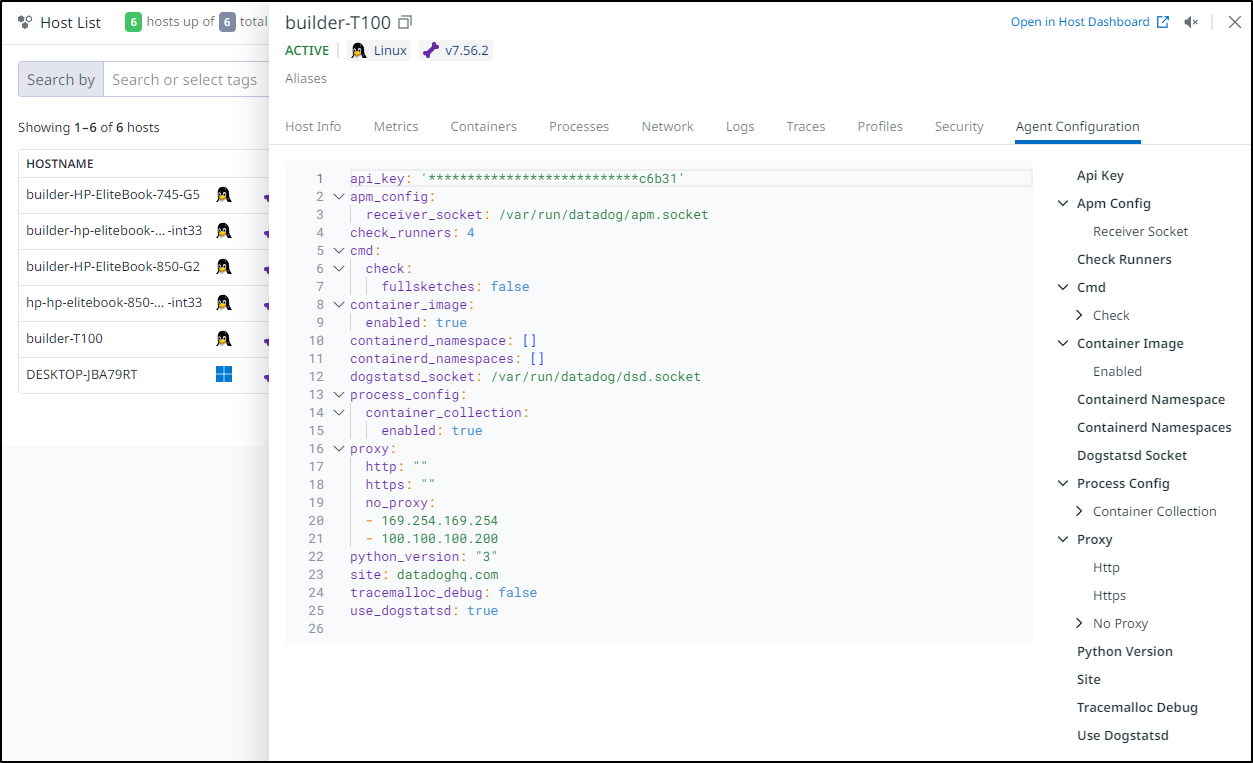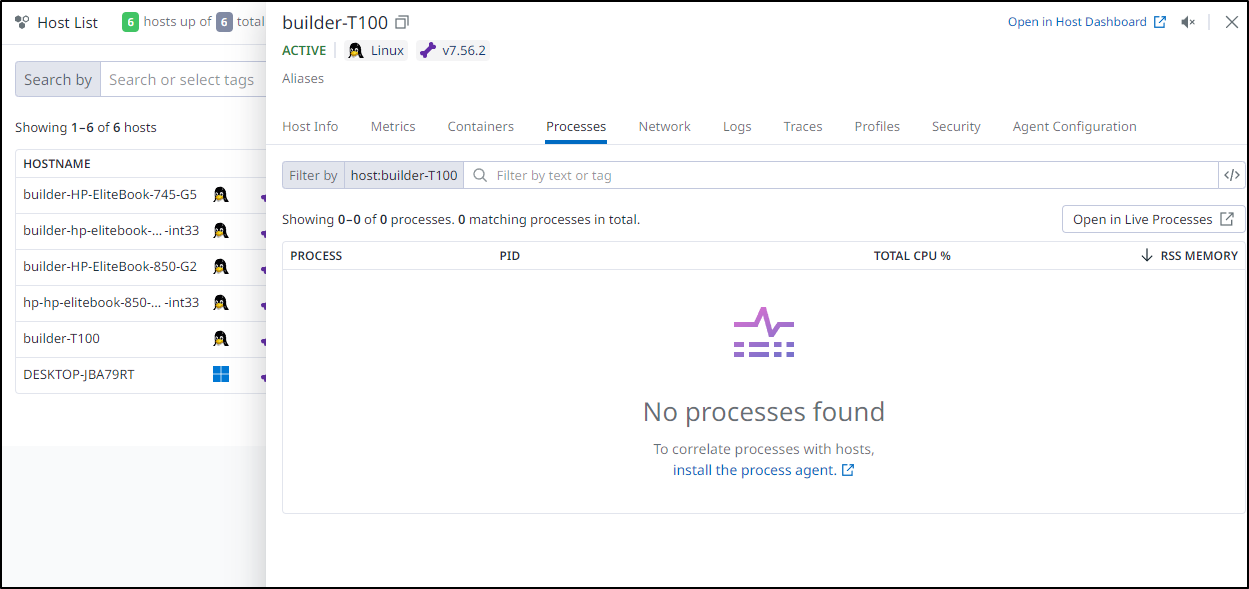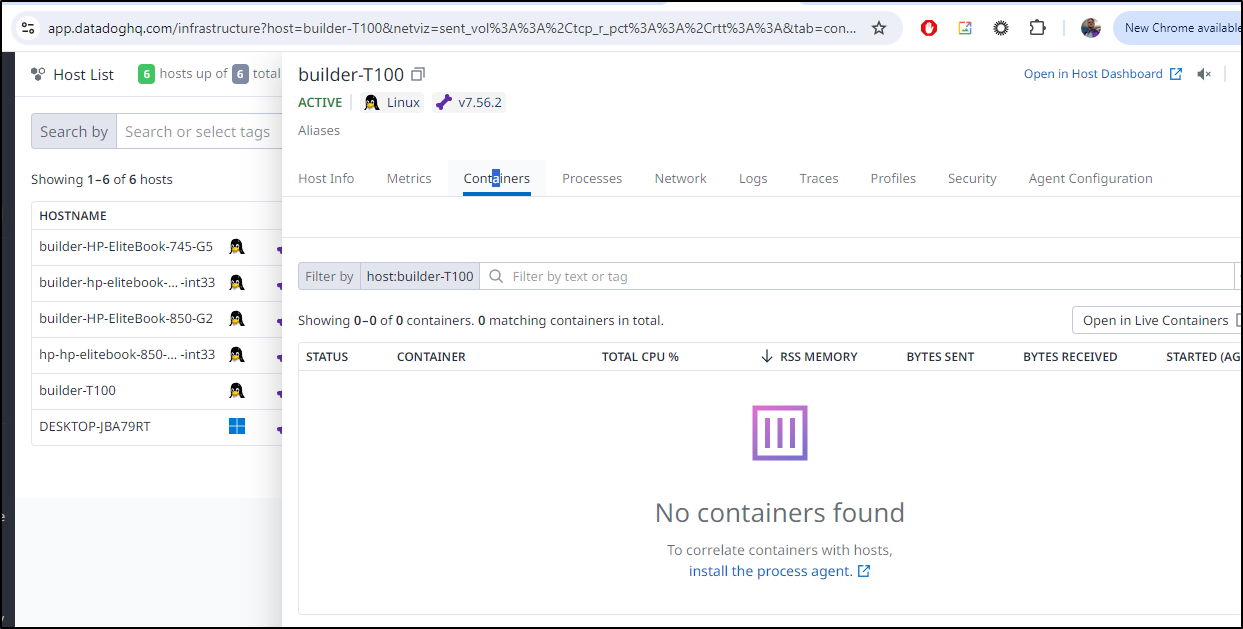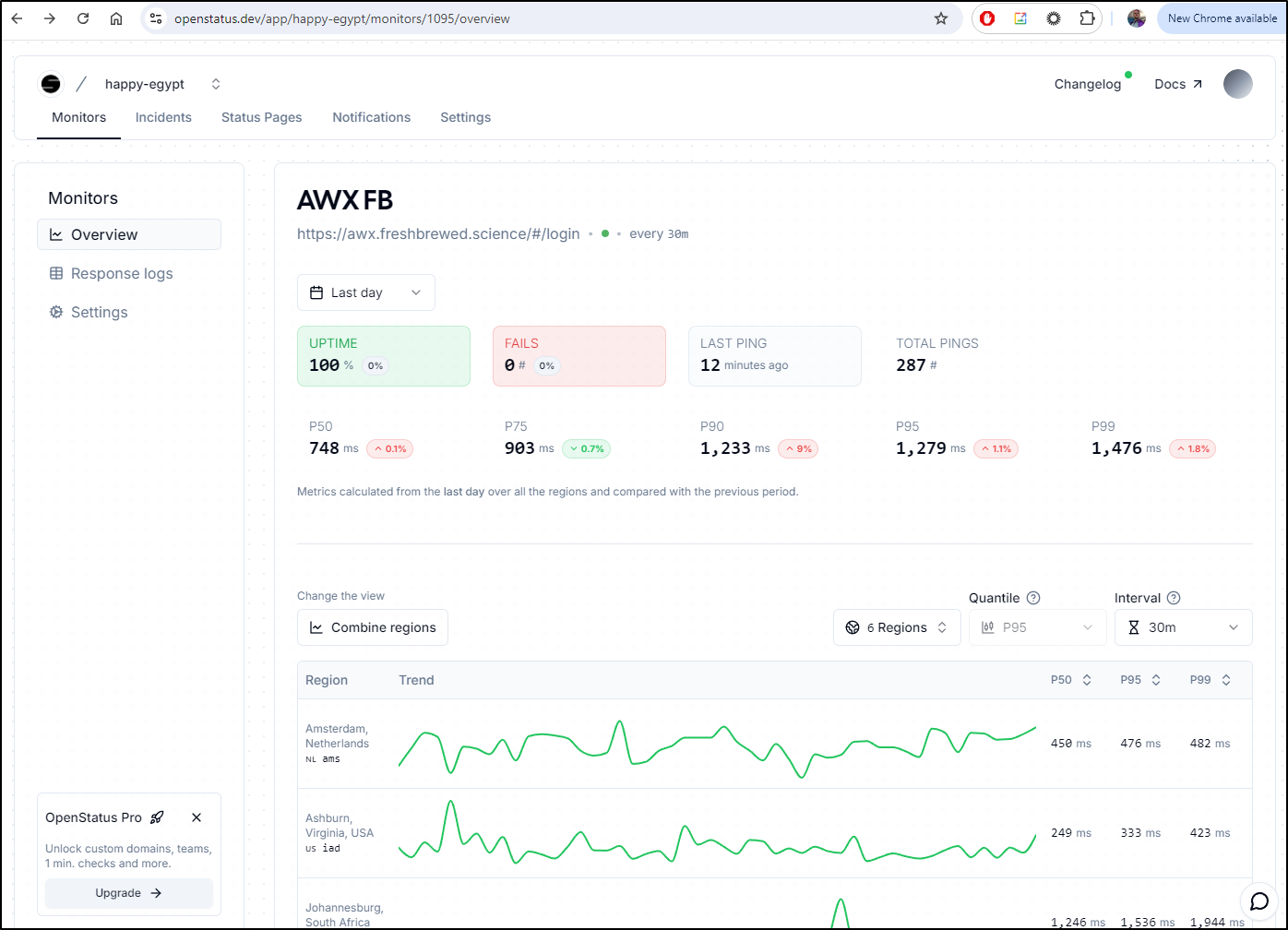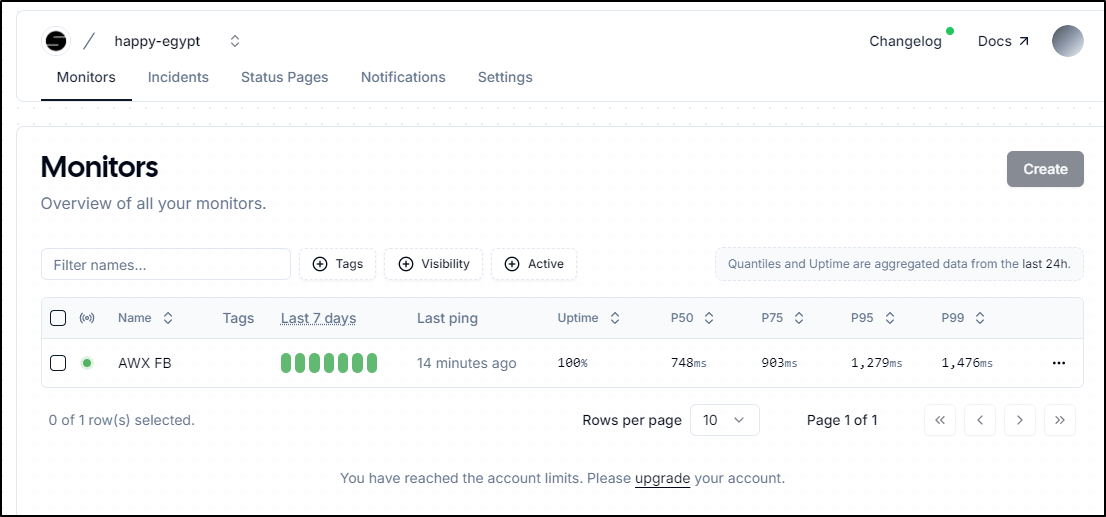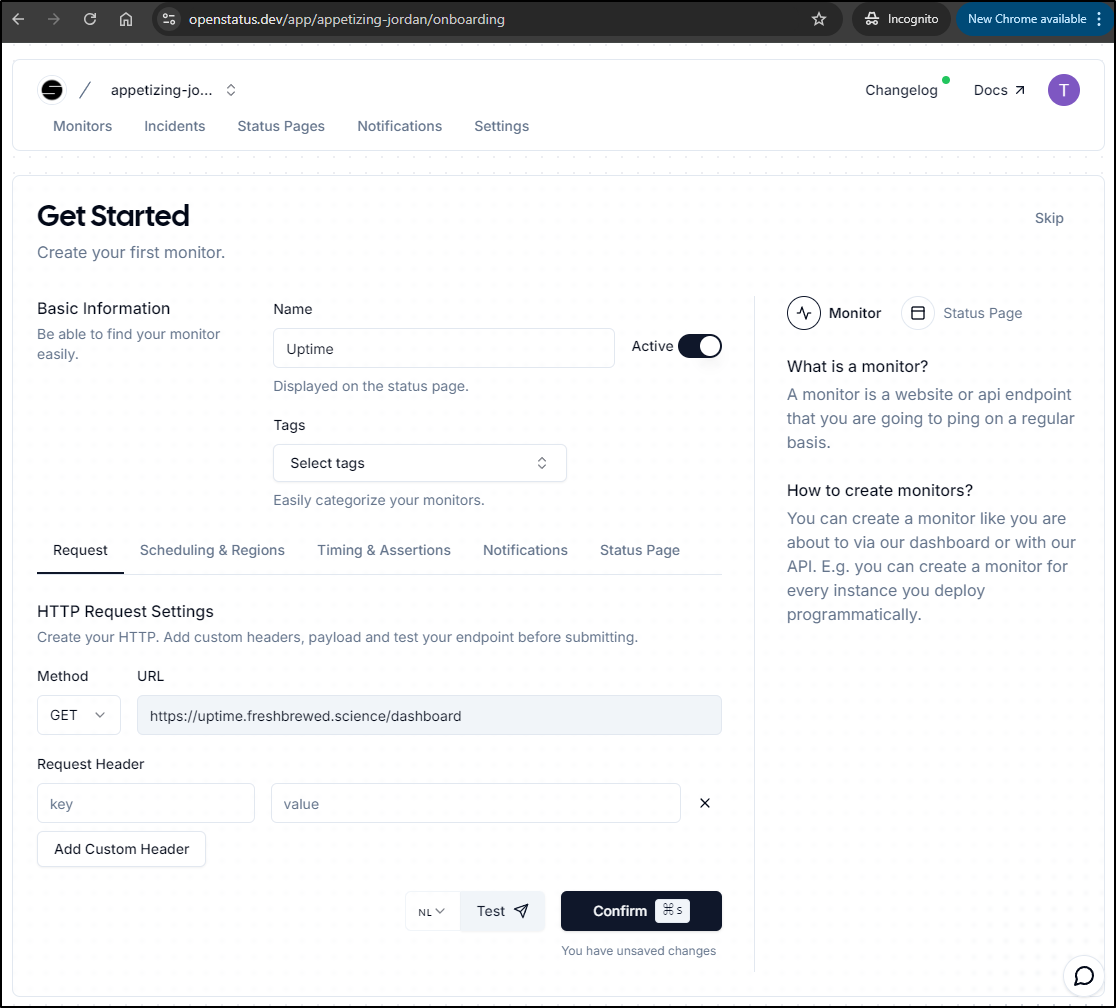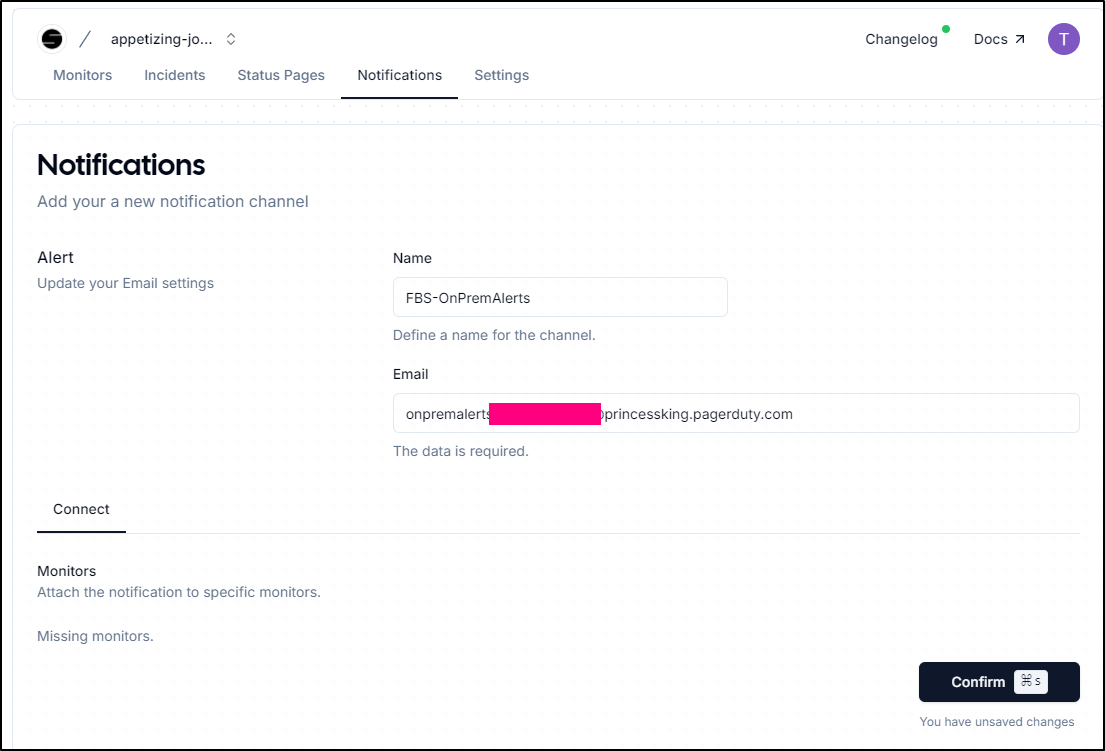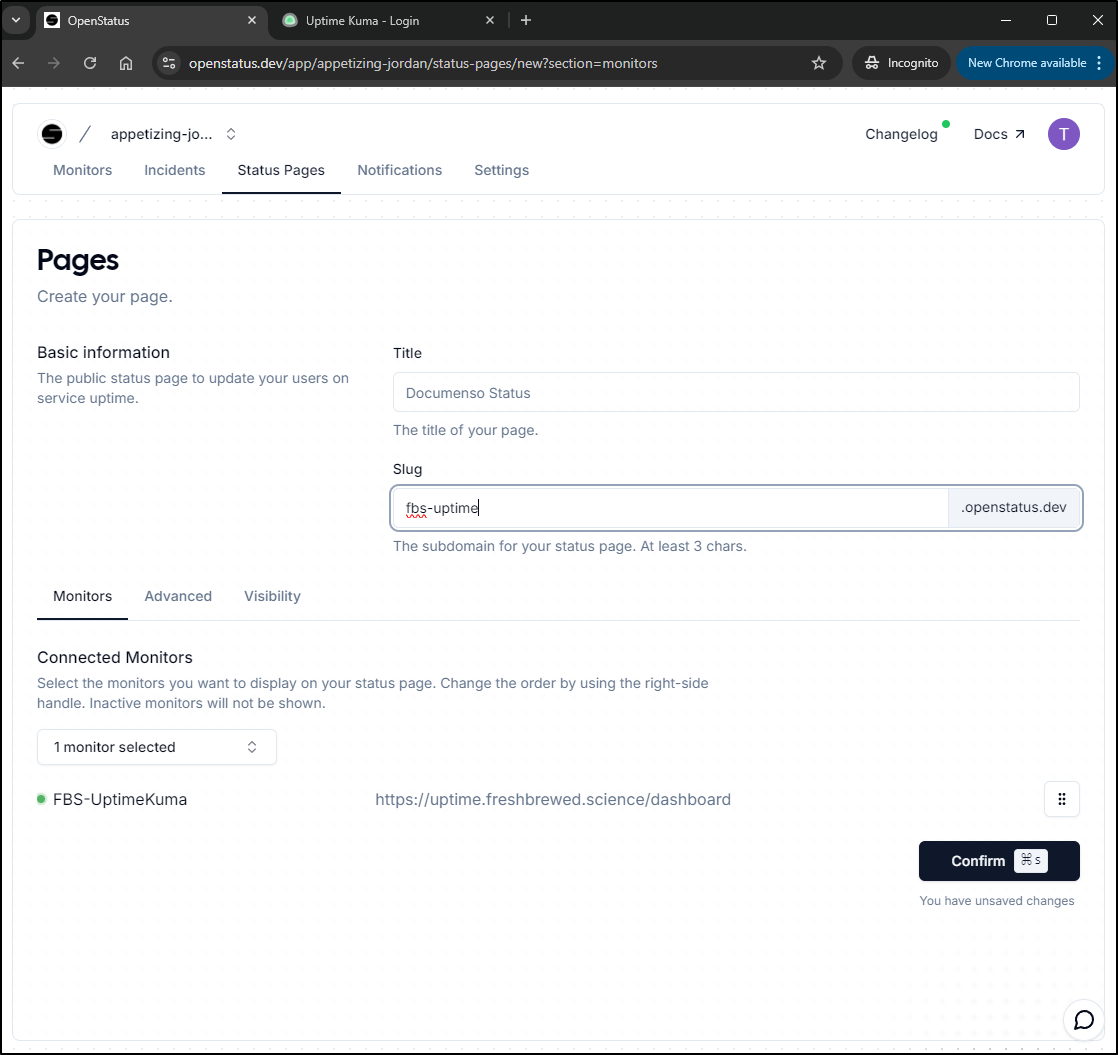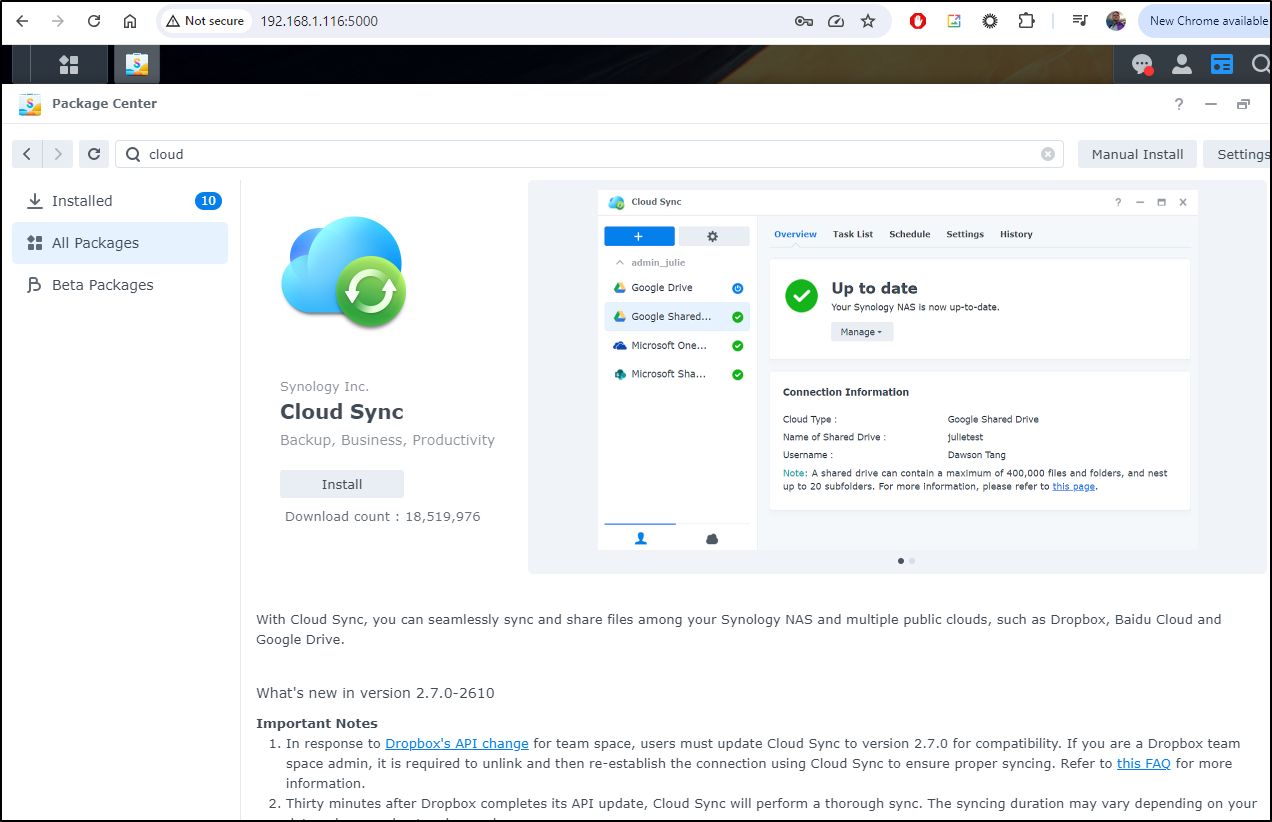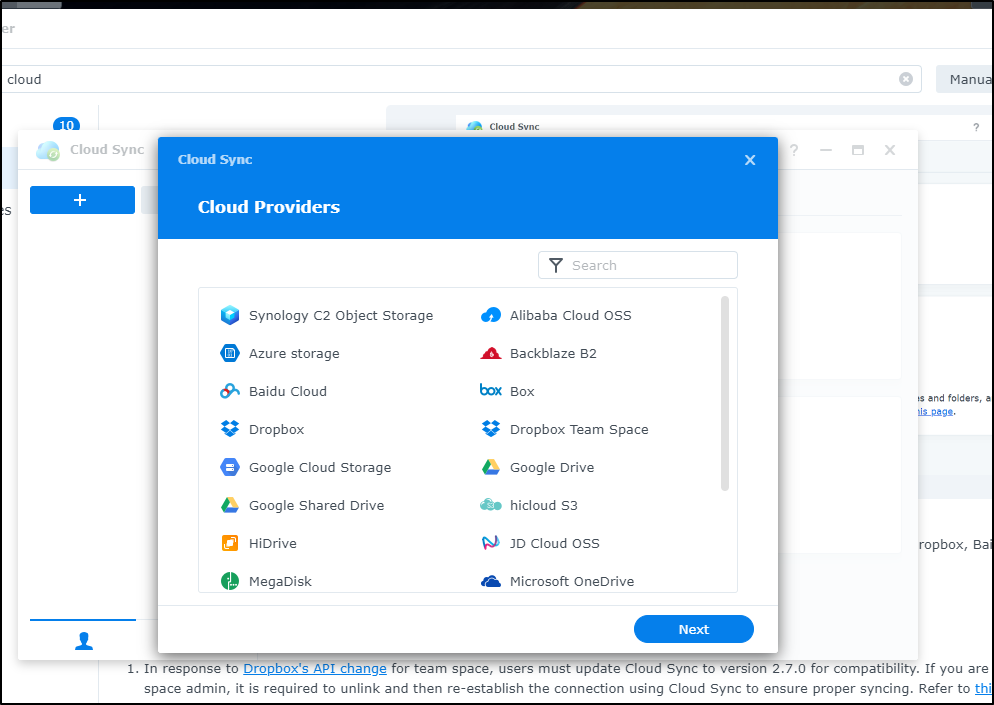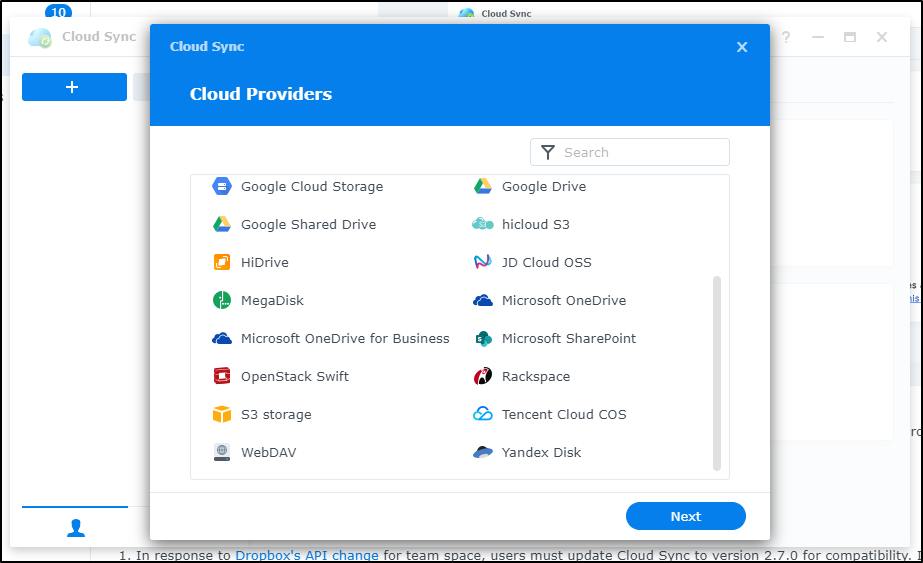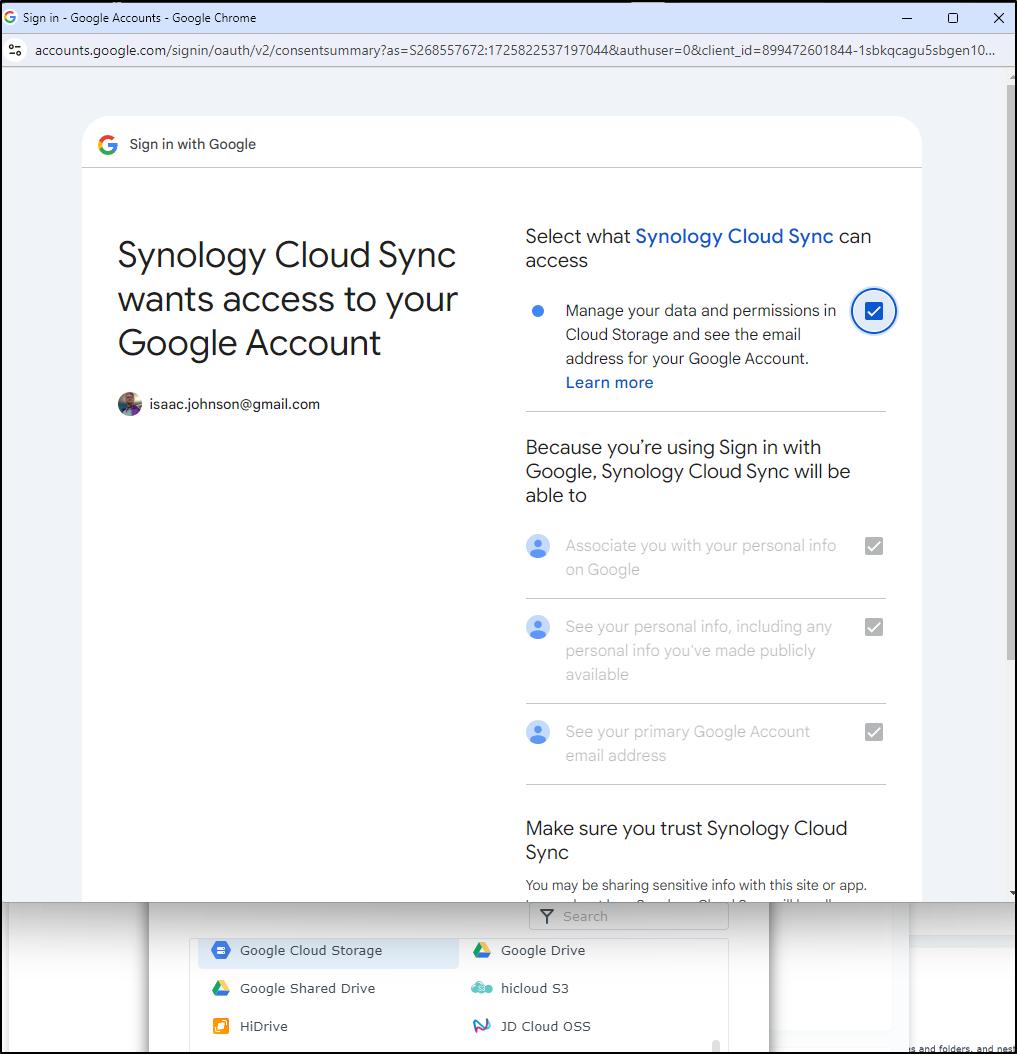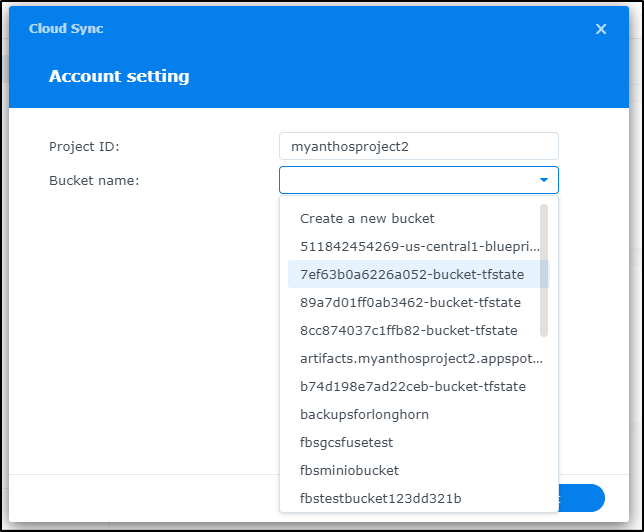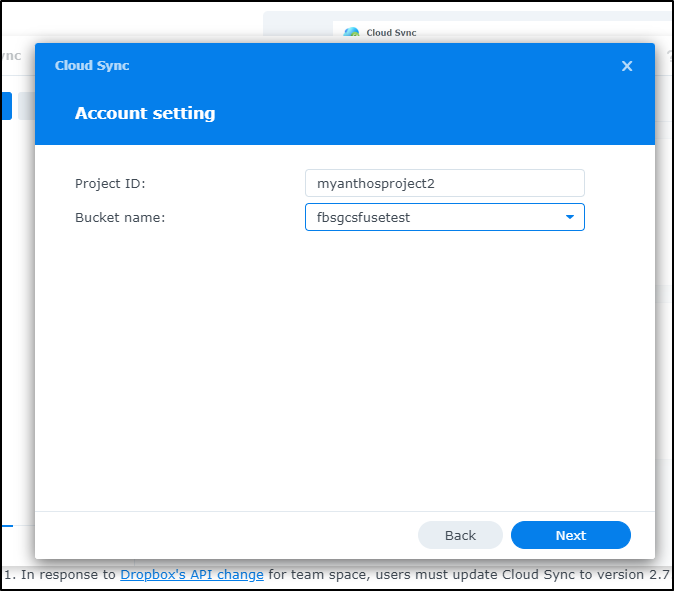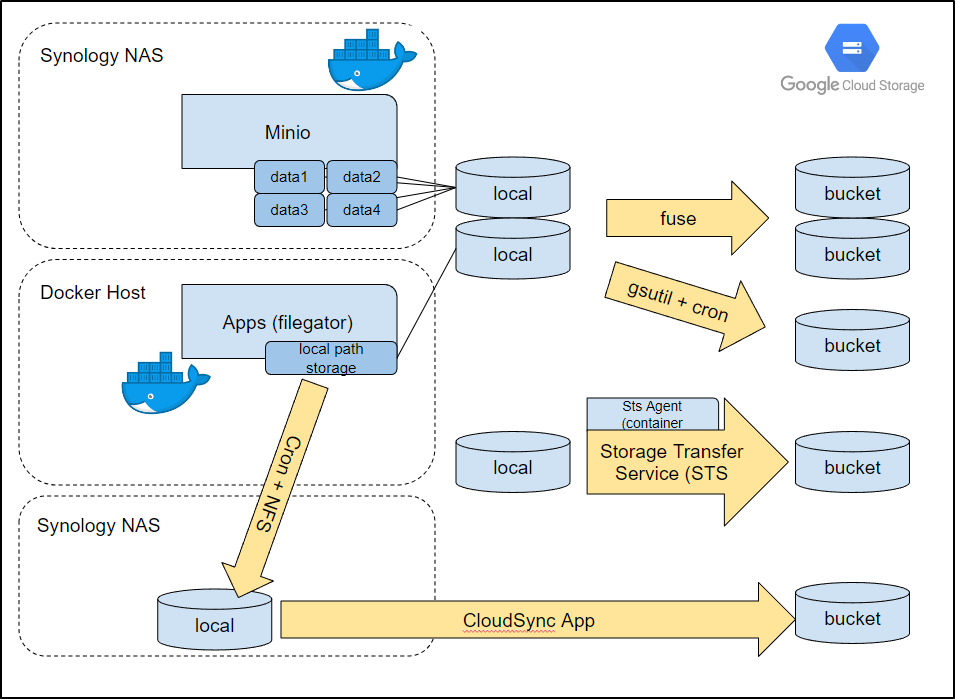Published: Sep 10, 2024 by Isaac Johnson
In our last two posts we explored Cloud-based backups. But what about on-prem? What choices do we have outside the major cloud providers?
Today we will look at using on-prem Synology NASes and how to set them up for NFS shares. We’ll explore Minio containerized and running on our NAS and then using Minio with s3fs for backups and syncing with cron.
Lastly, we’ll look at monitors using Datadog, OpenStatusand using Synology CloudSync to backup our NAS volumes to cloud storage such as GCP Buckets.
NAS
On-prem I keep two active Synology NAS appliances
The newer device is a Synology DS220+ with 10Gb of Memory (which I upgraded myself) and 10Tb of Storage (Raid 1+0).
The older of the two is a DS216Play with 6 Tb, also Raid 1+0. I tend to use WD Red Drives and only recently did this one have some failures that required replacements of both within a month of each other - they had lasted WAY longer than the specs, nearly 8 years of heavy constant use.
Updates are easy
Incurring a minor service blip as it restarts
I just need to watch the page and see when it’s completed
I’m not here to sell hardware, but I’m a fan of these and i think they’re quite excellent. my most important files, like photos are replicated between the two.
And for what it’s worth, I bought my last not from Amazon and instead from Microcenter. If I did it today, I would get the DS1522.
File shares
Knowing that my NAS(es) run the same basic OS, creating fileshares is pretty much identical between the two.
For instance, let’s say I desire a new block of space as a “Shared Folder” in the older NAS.
I can go to Shared Folders and click “Create”
I’ll give it a name such as “linuxbackups”. I do not want soft-delete so I’ll disable the “Recycle Bin”
I could encrypt the folder, but I won’t
Once I confirm settings
I can grant access to specific users
Once created, I’ll edit the share so we can get to the NFS Permissions
There in the “NFS Permissions” tab I’ll grant access to my local CIDR block for machines
Don’t forget to save it to take effect
Let’s say we want this for backups.
All I need to do is create a mount and an entry in fstab. Because my Dockerhost lives in the right CIDR, there is no need for user/pass authentication with NFS
builder@builder-T100:~$ sudo mkdir /mnt/linuxbackups
builder@builder-T100:~$ sudo vi /etc/fstab
builder@builder-T100:~$ tail -n1 /etc/fstab
192.168.1.129:/volume1/linuxbackups /mnt/linuxbackups nfs auto,nofail,noatime,nolock,intr,tcp,actimeo=1800 0 0
builder@builder-T100:~$ sudo mount -a
Now to test by creating a text file
builder@builder-T100:~$ echo "this is a test" | sudo tee /mnt/linuxbackups/testfile.txt
this is a test
Which I see show up right away
The fact is I’ve used this NAS for PostgreSQL backups for some time
builder@builder-T100:~$ cat /etc/fstab | grep 1.129
192.168.1.129:/volume1/postgres-prod-dbbackups /mnt/psqlbackups nfs auto,nofail,noatime,nolock,intr,tcp,actimeo=1800 0 0
192.168.1.129:/volume1/linuxbackups /mnt/linuxbackups nfs auto,nofail,noatime,nolock,intr,tcp,actimeo=1800 0 0
We can see that writeup from May of 2023 here.
Minio and Docker Compose
The NAS does have the power to run docker
ijohnson@sirnasilot:~$ sudo docker ps
Password:
CONTAINER ID IMAGE COMMAND CREATED STATUS PORTS
NAMES
5fa76248b69d portainer/portainer-ee:latest "/portainer" 14 months ago Up 27 minutes 0.0.0.0:8000->8000/tcp, :::8000->8000/tcp, 0.0.0.0:9443->9443/tcp, :::9443->9443/tcp, 9000/tcp portaineree
83af22fb4b32 registry:latest "/entrypoint.sh /etc…" 14 months ago Up 27 minutes 0.0.0.0:5050->5000/tcp, :::5050->5000/tcp
registry-1
This gave me the idea of using my newer NAS to actually run Minio in Docker (steps here)
As I want to clone the repo from Github, I need GIT installed.
I can actually use the Synology Package Center to install a GIT Server which includes the GIT binary
I’ll clone the repo
ijohnson@sirnasilot:~$ git clone https://github.com/minio/minio.git
Cloning into 'minio'...
remote: Enumerating objects: 106651, done.
remote: Counting objects: 100% (24644/24644), done.
remote: Compressing objects: 100% (845/845), done.
remote: Total 106651 (delta 23994), reused 23848 (delta 23796), pack-reused 82007 (from 1)
Receiving objects: 100% (106651/106651), 125.70 MiB | 24.33 MiB/s, done.
Resolving deltas: 100% (77976/77976), done.
Then use Docker Compose to pull the images
ijohnson@sirnasilot:~$ cd minio/docs/orchestration/docker-compose/
ijohnson@sirnasilot:~/minio/docs/orchestration/docker-compose$ sudo docker-compose pull
[+] Running 19/19
⠿ minio2 Skipped - Image is already being pulled by minio1 0.0s
⠿ minio3 Skipped - Image is already being pulled by minio1 0.0s
⠿ minio4 Skipped - Image is already being pulled by minio1 0.0s
⠿ minio1 Pulled 22.5s
⠿ 5f328c14e09d Pull complete 3.7s
⠿ 7c0037c31c26 Pull complete 5.8s
⠿ cb8ce3bb8f9a Pull complete 7.3s
⠿ f4b17c317d15 Pull complete 10.9s
⠿ 4cac341ffb02 Pull complete 12.4s
⠿ a08f6ff4d495 Pull complete 13.6s
⠿ 429760338d49 Pull complete 14.3s
⠿ f5eabdee403e Pull complete 15.2s
⠿ b8d89195f89b Pull complete 15.9s
⠿ nginx Pulled 14.4s
⠿ df20fa9351a1 Pull complete 0.9s
⠿ 3db268b1fe8f Pull complete 3.1s
⠿ f682f0660e7a Pull complete 5.4s
⠿ 7eb0e8838bc0 Pull complete 7.0s
⠿ e8bf1226cc17 Pull complete
I realized the first mistake when using docker-compose up was that I did not change the drive mounts
So I stopped it
I made some folders for “data1” and “data2”
ijohnson@sirnasilot:~/minio/docs/orchestration/docker-compose$ sudo mkdir /volume1/minio
ijohnson@sirnasilot:~/minio/docs/orchestration/docker-compose$ sudo mkdir /volume1/minio/data1-1
ijohnson@sirnasilot:~/minio/docs/orchestration/docker-compose$ sudo mkdir /volume1/minio/data1-2
ijohnson@sirnasilot:~/minio/docs/orchestration/docker-compose$ sudo mkdir /volume1/minio/data2-2
ijohnson@sirnasilot:~/minio/docs/orchestration/docker-compose$ sudo mkdir /volume1/minio/data2-2
ijohnson@sirnasilot:~/minio/docs/orchestration/docker-compose$ sudo mkdir /volume1/minio/data3-2
ijohnson@sirnasilot:~/minio/docs/orchestration/docker-compose$ sudo mkdir /volume1/minio/data3-2
ijohnson@sirnasilot:~/minio/docs/orchestration/docker-compose$ sudo mkdir /volume1/minio/data4-2
ijohnson@sirnasilot:~/minio/docs/orchestration/docker-compose$ sudo mkdir /volume1/minio/data4-2
I then gave it a real password and set the volumes correctly
ijohnson@sirnasilot:~/minio/docs/orchestration/docker-compose$ vi docker-compose.yaml
ijohnson@sirnasilot:~/minio/docs/orchestration/docker-compose$ cat docker-compose.yaml
version: '3.7'
# Settings and configurations that are common for all containers
x-minio-common: &minio-common
image: quay.io/minio/minio:RELEASE.2024-08-29T01-40-52Z
command: server --console-address ":9001" http://minio{1...4}/data{1...2}
expose:
- "9000"
- "9001"
environment:
MINIO_ROOT_USER: admin
MINIO_ROOT_PASSWORD: nottherealpassword
healthcheck:
test: ["CMD", "mc", "ready", "local"]
interval: 5s
timeout: 5s
retries: 5
# starts 4 docker containers running minio server instances.
# using nginx reverse proxy, load balancing, you can access
# it through port 9000.
services:
minio1:
<<: *minio-common
hostname: minio1
volumes:
- data1-1:/data1
- data1-2:/data2
minio2:
<<: *minio-common
hostname: minio2
volumes:
- data2-1:/data1
- data2-2:/data2
minio3:
<<: *minio-common
hostname: minio3
volumes:
- data3-1:/data1
- data3-2:/data2
minio4:
<<: *minio-common
hostname: minio4
volumes:
- data4-1:/data1
- data4-2:/data2
nginx:
image: nginx:1.19.2-alpine
hostname: nginx
volumes:
- ./nginx.conf:/etc/nginx/nginx.conf:ro
ports:
- "9000:9000"
- "9001:9001"
depends_on:
- minio1
- minio2
- minio3
- minio4
## By default this config uses default local driver,
## For custom volumes replace with volume driver configuration.
volumes:
data1-1:
driver: local
driver_opts:
o: bind
type: none
device: /volume1/minio/data1-1
data1-2:
driver: local
driver_opts:
o: bind
type: none
device: /volume1/minio/data1-2
data2-1:
driver: local
driver_opts:
o: bind
type: none
device: /volume1/minio/data2-1
data2-2:
driver: local
driver_opts:
o: bind
type: none
device: /volume1/minio/data2-2
data3-1:
driver: local
driver_opts:
o: bind
type: none
device: /volume1/minio/data3-1
data3-2:
driver: local
driver_opts:
o: bind
type: none
device: /volume1/minio/data3-2
data4-1:
driver: local
driver_opts:
o: bind
type: none
device: /volume1/minio/data4-1
data4-2:
driver: local
driver_opts:
o: bind
type: none
device: /volume1/minio/data4-2
I’m running interactive to start so I can debug any issues
ijohnson@sirnasilot:~/minio/docs/orchestration/docker-compose$ sudo docker-compose up
[+] Running 5/5
⠿ Container docker-compose-minio3-1 Recreated 5.8s
⠿ Container docker-compose-minio4-1 Recreated 7.5s
⠿ Container docker-compose-minio1-1 Recreated 6.5s
⠿ Container docker-compose-minio2-1 Recreated 7.4s
⠿ Container docker-compose-nginx-1 Recreated 2.0s
Attaching to docker-compose-minio1-1, docker-compose-minio2-1, docker-compose-minio3-1, docker-compose-minio4-1, docker-compose-nginx-1
docker-compose-minio3-1 | INFO: Waiting for at least 1 remote servers with valid configuration to be online
docker-compose-minio3-1 | INFO: Following servers are currently offline or unreachable [http://minio3:9000->http://minio4:9000 is unreachable: remote disconnected http://minio3:9000->http://minio1:9000 is unreachable: remote disconnected http://minio3:9000->http://minio2:9000 is unreachable: remote disconnected]
docker-compose-minio3-1 | INFO: Waiting for at least 1 remote servers with valid configuration to be online
docker-compose-minio3-1 | INFO: Following servers are currently offline or unreachable [http://minio3:9000->http://minio4:9000 is unreachable: remote disconnected http://minio3:9000->http://minio1:9000 is unreachable: remote disconnected http://minio3:9000->http://minio2:9000 is unreachable: remote disconnected]
docker-compose-minio3-1 |
docker-compose-minio3-1 | API: SYSTEM.grid
docker-compose-minio3-1 | Time: 11:44:05 UTC 09/07/2024
docker-compose-minio3-1 | Error: grid: http://minio3:9000 re-connecting to http://minio2:9000: dial tcp 172.18.0.5:9000: connect: no route to host (*net.OpError) Sleeping 795ms (3) (*fmt.wrapError)
docker-compose-minio3-1 | 6: internal/logger/logonce.go:118:logger.(*logOnceType).logOnceIf()
docker-compose-minio3-1 | 5: internal/logger/logonce.go:149:logger.LogOnceIf()
docker-compose-minio3-1 | 4: internal/grid/connection.go:59:grid.gridLogOnceIf()
docker-compose-minio3-1 | 3: internal/grid/connection.go:672:grid.(*Connection).connect.func1()
docker-compose-minio3-1 | 2: internal/grid/connection.go:678:grid.(*Connection).connect()
docker-compose-minio3-1 | 1: internal/grid/connection.go:275:grid.newConnection.func3()
docker-compose-minio3-1 |
docker-compose-minio3-1 | API: SYSTEM.grid
docker-compose-minio3-1 | Time: 11:44:05 UTC 09/07/2024
docker-compose-minio3-1 | Error: grid: http://minio3:9000 re-connecting to http://minio1:9000: dial tcp 172.18.0.4:9000: connect: no route to host (*net.OpError) Sleeping 275ms (3) (*fmt.wrapError)
docker-compose-minio3-1 | 6: internal/logger/logonce.go:118:logger.(*logOnceType).logOnceIf()
docker-compose-minio3-1 | 5: internal/logger/logonce.go:149:logger.LogOnceIf()
docker-compose-minio3-1 | 4: internal/grid/connection.go:59:grid.gridLogOnceIf()
docker-compose-minio3-1 | 3: internal/grid/connection.go:672:grid.(*Connection).connect.func1()
docker-compose-minio3-1 | 2: internal/grid/connection.go:678:grid.(*Connection).connect()
docker-compose-minio3-1 | 1: internal/grid/connection.go:275:grid.newConnection.func3()
docker-compose-minio3-1 | INFO: Waiting for at least 1 remote servers with valid configuration to be online
docker-compose-minio3-1 | INFO: Following servers are currently offline or unreachable [http://minio3:9000->http://minio4:9000 is unreachable: remote disconnected http://minio3:9000->http://minio1:9000 is unreachable: remote disconnected http://minio3:9000->http://minio2:9000 is unreachable: remote disconnected]
docker-compose-minio3-1 |
docker-compose-minio3-1 | API: SYSTEM.grid
docker-compose-minio3-1 | Time: 11:44:07 UTC 09/07/2024
docker-compose-minio3-1 | Error: grid: http://minio3:9000 re-connecting to http://minio2:9000: dial tcp 172.18.0.5:9000: i/o timeout (*net.OpError) Sleeping 0s (3) (*fmt.wrapError)
docker-compose-minio3-1 | 6: internal/logger/logonce.go:118:logger.(*logOnceType).logOnceIf()
docker-compose-minio3-1 | 5: internal/logger/logonce.go:149:logger.LogOnceIf()
docker-compose-minio3-1 | 4: internal/grid/connection.go:59:grid.gridLogOnceIf()
docker-compose-minio3-1 | 3: internal/grid/connection.go:672:grid.(*Connection).connect.func1()
docker-compose-minio3-1 | 2: internal/grid/connection.go:678:grid.(*Connection).connect()
docker-compose-minio3-1 | 1: internal/grid/connection.go:275:grid.newConnection.func3()
docker-compose-minio3-1 |
docker-compose-minio3-1 | API: SYSTEM.grid
docker-compose-minio3-1 | Time: 11:44:07 UTC 09/07/2024
docker-compose-minio3-1 | Error: grid: http://minio3:9000 re-connecting to http://minio1:9000: dial tcp 172.18.0.4:9000: i/o timeout (*net.OpError) Sleeping 0s (3) (*fmt.wrapError)
docker-compose-minio3-1 | 6: internal/logger/logonce.go:118:logger.(*logOnceType).logOnceIf()
docker-compose-minio3-1 | 5: internal/logger/logonce.go:149:logger.LogOnceIf()
docker-compose-minio3-1 | 4: internal/grid/connection.go:59:grid.gridLogOnceIf()
docker-compose-minio3-1 | 3: internal/grid/connection.go:672:grid.(*Connection).connect.func1()
docker-compose-minio3-1 | 2: internal/grid/connection.go:678:grid.(*Connection).connect()
docker-compose-minio3-1 | 1: internal/grid/connection.go:275:grid.newConnection.func3()
docker-compose-minio3-1 |
docker-compose-minio3-1 | API: SYSTEM.grid
docker-compose-minio3-1 | Time: 11:44:07 UTC 09/07/2024
docker-compose-minio3-1 | Error: grid: http://minio3:9000 re-connecting to http://minio1:9000: dial tcp 172.18.0.4:9000: i/o timeout (*net.OpError) Sleeping 0s (3) (*fmt.wrapError)
docker-compose-minio3-1 | 6: internal/logger/logonce.go:118:logger.(*logOnceType).logOnceIf()
docker-compose-minio3-1 | 5: internal/logger/logonce.go:149:logger.LogOnceIf()
docker-compose-minio3-1 | 4: internal/grid/connection.go:59:grid.gridLogOnceIf()
docker-compose-minio3-1 | 3: internal/grid/connection.go:672:grid.(*Connection).connect.func1()
docker-compose-minio3-1 | 2: internal/grid/connection.go:678:grid.(*Connection).connect()
docker-compose-minio3-1 | 1: internal/grid/connection.go:275:grid.newConnection.func3()
docker-compose-minio3-1 |
docker-compose-minio3-1 | API: SYSTEM.grid
docker-compose-minio3-1 | Time: 11:44:07 UTC 09/07/2024
docker-compose-minio3-1 | Error: grid: http://minio3:9000 re-connecting to http://minio2:9000: dial tcp 172.18.0.5:9000: i/o timeout (*net.OpError) Sleeping 0s (3) (*fmt.wrapError)
docker-compose-minio3-1 | 6: internal/logger/logonce.go:118:logger.(*logOnceType).logOnceIf()
docker-compose-minio3-1 | 5: internal/logger/logonce.go:149:logger.LogOnceIf()
docker-compose-minio3-1 | 4: internal/grid/connection.go:59:grid.gridLogOnceIf()
docker-compose-minio3-1 | 3: internal/grid/connection.go:672:grid.(*Connection).connect.func1()
docker-compose-minio3-1 | 2: internal/grid/connection.go:678:grid.(*Connection).connect()
docker-compose-minio3-1 | 1: internal/grid/connection.go:275:grid.newConnection.func3()
docker-compose-minio3-1 | INFO: Waiting for at least 1 remote servers with valid configuration to be online
docker-compose-minio3-1 | INFO: Following servers are currently offline or unreachable [http://minio3:9000->http://minio4:9000 is unreachable: remote disconnected http://minio3:9000->http://minio2:9000 is unreachable: remote disconnected http://minio3:9000->http://minio1:9000 is unreachable: remote disconnected]
docker-compose-minio3-1 |
docker-compose-minio3-1 | API: SYSTEM.grid
docker-compose-minio3-1 | Time: 11:44:08 UTC 09/07/2024
docker-compose-minio3-1 | Error: grid: http://minio3:9000 re-connecting to http://minio1:9000: dial tcp 172.18.0.4:9000: connect: connection refused (*net.OpError) Sleeping 1.341s (3) (*fmt.wrapError)
docker-compose-minio3-1 | 6: internal/logger/logonce.go:118:logger.(*logOnceType).logOnceIf()
docker-compose-minio3-1 | 5: internal/logger/logonce.go:149:logger.LogOnceIf()
docker-compose-minio3-1 | 4: internal/grid/connection.go:59:grid.gridLogOnceIf()
docker-compose-minio3-1 | 3: internal/grid/connection.go:672:grid.(*Connection).connect.func1()
docker-compose-minio3-1 | 2: internal/grid/connection.go:678:grid.(*Connection).connect()
docker-compose-minio3-1 | 1: internal/grid/connection.go:275:grid.newConnection.func3()
docker-compose-minio3-1 | INFO: Unable to use the drive http://minio1:9000/data1: drive not found, will be retried
docker-compose-minio3-1 | INFO: Unable to use the drive http://minio2:9000/data1: drive not found, will be retried
docker-compose-minio3-1 | INFO: Unable to use the drive http://minio1:9000/data2: drive not found, will be retried
docker-compose-minio3-1 | INFO: Unable to use the drive http://minio2:9000/data2: drive not found, will be retried
docker-compose-minio3-1 | INFO: Waiting for quorum READ healthcheck to succeed retrying in 28.326997ms.. possible cause unhealthy sets
docker-compose-minio3-1 | INFO: (Pool: 0 Set: 0 Healthy: false)
docker-compose-minio3-1 | INFO: Waiting for quorum READ healthcheck to succeed retrying in 218.712636ms.. possible cause unhealthy sets
docker-compose-minio3-1 | INFO: (Pool: 0 Set: 0 Healthy: false)
docker-compose-minio3-1 |
docker-compose-minio3-1 | API: SYSTEM.grid
docker-compose-minio3-1 | Time: 11:44:09 UTC 09/07/2024
docker-compose-minio3-1 | DeploymentID: 70f64fa5-5f0c-4b67-9d9b-5209ee42cdde
docker-compose-minio3-1 | Error: grid: http://minio3:9000 re-connecting to http://minio1:9000: dial tcp 172.18.0.4:9000: connect: connection refused (*net.OpError) Sleeping 1.592s (3) (*fmt.wrapError)
docker-compose-minio3-1 | 6: internal/logger/logonce.go:118:logger.(*logOnceType).logOnceIf()
docker-compose-minio3-1 | 5: internal/logger/logonce.go:149:logger.LogOnceIf()
docker-compose-minio3-1 | 4: internal/grid/connection.go:59:grid.gridLogOnceIf()
docker-compose-minio3-1 | 3: internal/grid/connection.go:672:grid.(*Connection).connect.func1()
docker-compose-minio3-1 | 2: internal/grid/connection.go:678:grid.(*Connection).connect()
docker-compose-minio3-1 | 1: internal/grid/connection.go:275:grid.newConnection.func3()
docker-compose-minio4-1 | INFO: Unable to use the drive http://minio1:9000/data1: drive not found, will be retried
docker-compose-minio4-1 | INFO: Unable to use the drive http://minio2:9000/data1: drive not found, will be retried
docker-compose-minio4-1 | INFO: Unable to use the drive http://minio1:9000/data2: drive not found, will be retried
docker-compose-minio4-1 | INFO: Unable to use the drive http://minio2:9000/data2: drive not found, will be retried
docker-compose-minio4-1 | INFO: Waiting for all MinIO sub-systems to be initialize...
docker-compose-minio4-1 | INFO: Configured max API requests per node based on available memory: 712
docker-compose-minio4-1 | INFO: All MinIO sub-systems initialized successfully in 2.982574ms
docker-compose-minio4-1 | INFO: IAM load(startup) finished. (duration: 6.466975ms)
docker-compose-minio4-1 | ---------------------------
docker-compose-minio4-1 | MinIO Object Storage Server
docker-compose-minio4-1 | Copyright: 2015-2024 MinIO, Inc.
docker-compose-minio4-1 | License: GNU AGPLv3 - https://www.gnu.org/licenses/agpl-3.0.html
docker-compose-minio4-1 | Version: RELEASE.2024-08-29T01-40-52Z (go1.22.6 linux/amd64)
docker-compose-minio4-1 |
docker-compose-minio4-1 | API: http://172.18.0.3:9000 http://127.0.0.1:9000
docker-compose-minio4-1 | WebUI: http://172.18.0.3:9001 http://127.0.0.1:9001
docker-compose-minio4-1 |
docker-compose-minio4-1 | Docs: https://docs.min.io
docker-compose-minio4-1 | ---------------------------
docker-compose-minio3-1 | INFO: Waiting for all MinIO sub-systems to be initialize...
docker-compose-minio3-1 | INFO: Configured max API requests per node based on available memory: 719
docker-compose-minio3-1 | INFO: All MinIO sub-systems initialized successfully in 6.385275ms
docker-compose-minio3-1 | ---------------------------
docker-compose-minio3-1 | MinIO Object Storage Server
docker-compose-minio3-1 | Copyright: 2015-2024 MinIO, Inc.
docker-compose-minio3-1 | License: GNU AGPLv3 - https://www.gnu.org/licenses/agpl-3.0.html
docker-compose-minio3-1 | Version: RELEASE.2024-08-29T01-40-52Z (go1.22.6 linux/amd64)
docker-compose-minio3-1 |
docker-compose-minio3-1 | API: http://172.18.0.2:9000 http://127.0.0.1:9000
docker-compose-minio3-1 | WebUI: http://172.18.0.2:9001 http://127.0.0.1:9001
docker-compose-minio3-1 |
docker-compose-minio3-1 | Docs: https://docs.min.io
docker-compose-minio3-1 | ---------------------------
docker-compose-minio3-1 | INFO: IAM load(startup) finished. (duration: 8.229168ms)
docker-compose-minio3-1 |
docker-compose-minio3-1 | API: SYSTEM.grid
docker-compose-minio3-1 | Time: 11:44:09 UTC 09/07/2024
docker-compose-minio3-1 | DeploymentID: 70f64fa5-5f0c-4b67-9d9b-5209ee42cdde
docker-compose-minio3-1 | Error: grid: http://minio3:9000 re-connecting to http://minio1:9000: dial tcp 172.18.0.4:9000: connect: connection refused (*net.OpError) Sleeping 1.276s (3) (*fmt.wrapError)
docker-compose-minio3-1 | 6: internal/logger/logonce.go:118:logger.(*logOnceType).logOnceIf()
docker-compose-minio3-1 | 5: internal/logger/logonce.go:149:logger.LogOnceIf()
docker-compose-minio3-1 | 4: internal/grid/connection.go:59:grid.gridLogOnceIf()
docker-compose-minio3-1 | 3: internal/grid/connection.go:672:grid.(*Connection).connect.func1()
docker-compose-minio3-1 | 2: internal/grid/connection.go:678:grid.(*Connection).connect()
docker-compose-minio3-1 | 1: internal/grid/connection.go:275:grid.newConnection.func3()
docker-compose-minio3-1 |
docker-compose-minio3-1 | API: SYSTEM.grid
docker-compose-minio3-1 | Time: 11:44:10 UTC 09/07/2024
docker-compose-minio3-1 | DeploymentID: 70f64fa5-5f0c-4b67-9d9b-5209ee42cdde
docker-compose-minio3-1 | Error: grid: http://minio3:9000 re-connecting to http://minio2:9000: dial tcp 172.18.0.5:9000: i/o timeout (*net.OpError) Sleeping 0s (3) (*fmt.wrapError)
docker-compose-minio3-1 | 6: internal/logger/logonce.go:118:logger.(*logOnceType).logOnceIf()
docker-compose-minio3-1 | 5: internal/logger/logonce.go:149:logger.LogOnceIf()
docker-compose-minio3-1 | 4: internal/grid/connection.go:59:grid.gridLogOnceIf()
docker-compose-minio3-1 | 3: internal/grid/connection.go:672:grid.(*Connection).connect.func1()
docker-compose-minio3-1 | 2: internal/grid/connection.go:678:grid.(*Connection).connect()
docker-compose-minio3-1 | 1: internal/grid/connection.go:275:grid.newConnection.func3()
docker-compose-minio3-1 |
docker-compose-minio3-1 | API: SYSTEM.grid
docker-compose-minio3-1 | Time: 11:44:10 UTC 09/07/2024
docker-compose-minio3-1 | DeploymentID: 70f64fa5-5f0c-4b67-9d9b-5209ee42cdde
docker-compose-minio3-1 | Error: grid: http://minio3:9000 re-connecting to http://minio2:9000: dial tcp 172.18.0.5:9000: connect: connection refused (*net.OpError) Sleeping 1.05s (3) (*fmt.wrapError)
docker-compose-minio3-1 | 6: internal/logger/logonce.go:118:logger.(*logOnceType).logOnceIf()
docker-compose-minio3-1 | 5: internal/logger/logonce.go:149:logger.LogOnceIf()
docker-compose-minio3-1 | 4: internal/grid/connection.go:59:grid.gridLogOnceIf()
docker-compose-minio3-1 | 3: internal/grid/connection.go:672:grid.(*Connection).connect.func1()
docker-compose-minio3-1 | 2: internal/grid/connection.go:678:grid.(*Connection).connect()
docker-compose-minio3-1 | 1: internal/grid/connection.go:275:grid.newConnection.func3()
docker-compose-minio3-1 |
docker-compose-minio3-1 | API: SYSTEM.grid
docker-compose-minio3-1 | Time: 11:44:10 UTC 09/07/2024
docker-compose-minio3-1 | DeploymentID: 70f64fa5-5f0c-4b67-9d9b-5209ee42cdde
docker-compose-minio3-1 | Error: grid: http://minio3:9000 re-connecting to http://minio2:9000: dial tcp 172.18.0.5:9000: connect: connection refused (*net.OpError) Sleeping 605ms (3) (*fmt.wrapError)
docker-compose-minio3-1 | 6: internal/logger/logonce.go:118:logger.(*logOnceType).logOnceIf()
docker-compose-minio3-1 | 5: internal/logger/logonce.go:149:logger.LogOnceIf()
docker-compose-minio3-1 | 4: internal/grid/connection.go:59:grid.gridLogOnceIf()
docker-compose-minio3-1 | 3: internal/grid/connection.go:672:grid.(*Connection).connect.func1()
docker-compose-minio3-1 | 2: internal/grid/connection.go:678:grid.(*Connection).connect()
docker-compose-minio3-1 | 1: internal/grid/connection.go:275:grid.newConnection.func3()
docker-compose-minio3-1 |
docker-compose-minio3-1 | API: SYSTEM.grid
docker-compose-minio3-1 | Time: 11:44:10 UTC 09/07/2024
docker-compose-minio3-1 | DeploymentID: 70f64fa5-5f0c-4b67-9d9b-5209ee42cdde
docker-compose-minio3-1 | Error: grid: http://minio3:9000 re-connecting to http://minio2:9000: dial tcp 172.18.0.5:9000: connect: connection refused (*net.OpError) Sleeping 1.068s (3) (*fmt.wrapError)
docker-compose-minio3-1 | 6: internal/logger/logonce.go:118:logger.(*logOnceType).logOnceIf()
docker-compose-minio3-1 | 5: internal/logger/logonce.go:149:logger.LogOnceIf()
docker-compose-minio3-1 | 4: internal/grid/connection.go:59:grid.gridLogOnceIf()
docker-compose-minio3-1 | 3: internal/grid/connection.go:672:grid.(*Connection).connect.func1()
docker-compose-minio3-1 | 2: internal/grid/connection.go:678:grid.(*Connection).connect()
docker-compose-minio3-1 | 1: internal/grid/connection.go:275:grid.newConnection.func3()
docker-compose-minio3-1 |
docker-compose-minio3-1 | API: SYSTEM.grid
docker-compose-minio3-1 | Time: 11:44:11 UTC 09/07/2024
docker-compose-minio3-1 | DeploymentID: 70f64fa5-5f0c-4b67-9d9b-5209ee42cdde
docker-compose-minio3-1 | Error: grid: http://minio3:9000 re-connecting to http://minio1:9000: dial tcp 172.18.0.4:9000: connect: connection refused (*net.OpError) Sleeping 1.163s (3) (*fmt.wrapError)
docker-compose-minio3-1 | 6: internal/logger/logonce.go:118:logger.(*logOnceType).logOnceIf()
docker-compose-minio3-1 | 5: internal/logger/logonce.go:149:logger.LogOnceIf()
docker-compose-minio3-1 | 4: internal/grid/connection.go:59:grid.gridLogOnceIf()
docker-compose-minio3-1 | 3: internal/grid/connection.go:672:grid.(*Connection).connect.func1()
docker-compose-minio3-1 | 2: internal/grid/connection.go:678:grid.(*Connection).connect()
docker-compose-minio3-1 | 1: internal/grid/connection.go:275:grid.newConnection.func3()
docker-compose-minio3-1 |
docker-compose-minio3-1 | API: SYSTEM.grid
docker-compose-minio3-1 | Time: 11:44:11 UTC 09/07/2024
docker-compose-minio3-1 | DeploymentID: 70f64fa5-5f0c-4b67-9d9b-5209ee42cdde
docker-compose-minio3-1 | Error: grid: http://minio3:9000 re-connecting to http://minio1:9000: dial tcp 172.18.0.4:9000: connect: connection refused (*net.OpError) Sleeping 1.769s (3) (*fmt.wrapError)
docker-compose-minio3-1 | 6: internal/logger/logonce.go:118:logger.(*logOnceType).logOnceIf()
docker-compose-minio3-1 | 5: internal/logger/logonce.go:149:logger.LogOnceIf()
docker-compose-minio3-1 | 4: internal/grid/connection.go:59:grid.gridLogOnceIf()
docker-compose-minio3-1 | 3: internal/grid/connection.go:672:grid.(*Connection).connect.func1()
docker-compose-minio3-1 | 2: internal/grid/connection.go:678:grid.(*Connection).connect()
docker-compose-minio3-1 | 1: internal/grid/connection.go:275:grid.newConnection.func3()
docker-compose-minio3-1 |
docker-compose-minio3-1 | API: SYSTEM.grid
docker-compose-minio3-1 | Time: 11:44:11 UTC 09/07/2024
docker-compose-minio3-1 | DeploymentID: 70f64fa5-5f0c-4b67-9d9b-5209ee42cdde
docker-compose-minio3-1 | Error: grid: http://minio3:9000 re-connecting to http://minio2:9000: dial tcp 172.18.0.5:9000: connect: connection refused (*net.OpError) Sleeping 1.423s (3) (*fmt.wrapError)
docker-compose-minio3-1 | 6: internal/logger/logonce.go:118:logger.(*logOnceType).logOnceIf()
docker-compose-minio3-1 | 5: internal/logger/logonce.go:149:logger.LogOnceIf()
docker-compose-minio3-1 | 4: internal/grid/connection.go:59:grid.gridLogOnceIf()
docker-compose-minio3-1 | 3: internal/grid/connection.go:672:grid.(*Connection).connect.func1()
docker-compose-minio3-1 | 2: internal/grid/connection.go:678:grid.(*Connection).connect()
docker-compose-minio3-1 | 1: internal/grid/connection.go:275:grid.newConnection.func3()
docker-compose-minio3-1 |
docker-compose-minio3-1 | API: SYSTEM.grid
docker-compose-minio3-1 | Time: 11:44:11 UTC 09/07/2024
docker-compose-minio3-1 | DeploymentID: 70f64fa5-5f0c-4b67-9d9b-5209ee42cdde
docker-compose-minio3-1 | Error: grid: http://minio3:9000 re-connecting to http://minio2:9000: dial tcp 172.18.0.5:9000: connect: connection refused (*net.OpError) Sleeping 1.907s (3) (*fmt.wrapError)
docker-compose-minio3-1 | 6: internal/logger/logonce.go:118:logger.(*logOnceType).logOnceIf()
docker-compose-minio3-1 | 5: internal/logger/logonce.go:149:logger.LogOnceIf()
docker-compose-minio3-1 | 4: internal/grid/connection.go:59:grid.gridLogOnceIf()
docker-compose-minio3-1 | 3: internal/grid/connection.go:672:grid.(*Connection).connect.func1()
docker-compose-minio3-1 | 2: internal/grid/connection.go:678:grid.(*Connection).connect()
docker-compose-minio3-1 | 1: internal/grid/connection.go:275:grid.newConnection.func3()
docker-compose-minio1-1 | INFO: Unable to use the drive http://minio2:9000/data1: drive not found, will be retried
docker-compose-minio1-1 | INFO: Unable to use the drive http://minio2:9000/data2: drive not found, will be retried
docker-compose-minio1-1 | INFO: Waiting for all MinIO sub-systems to be initialize...
docker-compose-minio1-1 | INFO: Configured max API requests per node based on available memory: 705
docker-compose-minio1-1 | INFO: All MinIO sub-systems initialized successfully in 3.732779ms
docker-compose-minio1-1 | ---------------------------
docker-compose-minio1-1 | MinIO Object Storage Server
docker-compose-minio1-1 | Copyright: 2015-2024 MinIO, Inc.
docker-compose-minio1-1 | License: GNU AGPLv3 - https://www.gnu.org/licenses/agpl-3.0.html
docker-compose-minio1-1 | Version: RELEASE.2024-08-29T01-40-52Z (go1.22.6 linux/amd64)
docker-compose-minio1-1 |
docker-compose-minio1-1 | API: http://172.18.0.4:9000 http://127.0.0.1:9000
docker-compose-minio1-1 | WebUI: http://172.18.0.4:9001 http://127.0.0.1:9001
docker-compose-minio1-1 |
docker-compose-minio1-1 | Docs: https://docs.min.io
docker-compose-minio1-1 | ---------------------------
docker-compose-minio1-1 | INFO: IAM load(startup) finished. (duration: 3.435315ms)
docker-compose-minio3-1 |
docker-compose-minio3-1 | API: SYSTEM.grid
docker-compose-minio3-1 | Time: 11:44:12 UTC 09/07/2024
docker-compose-minio3-1 | DeploymentID: 70f64fa5-5f0c-4b67-9d9b-5209ee42cdde
docker-compose-minio3-1 | Error: grid: http://minio3:9000 re-connecting to http://minio2:9000: dial tcp 172.18.0.5:9000: connect: connection refused (*net.OpError) Sleeping 1.022s (3) (*fmt.wrapError)
docker-compose-minio3-1 | 6: internal/logger/logonce.go:118:logger.(*logOnceType).logOnceIf()
docker-compose-minio3-1 | 5: internal/logger/logonce.go:149:logger.LogOnceIf()
docker-compose-minio3-1 | 4: internal/grid/connection.go:59:grid.gridLogOnceIf()
docker-compose-minio3-1 | 3: internal/grid/connection.go:672:grid.(*Connection).connect.func1()
docker-compose-minio3-1 | 2: internal/grid/connection.go:678:grid.(*Connection).connect()
docker-compose-minio3-1 | 1: internal/grid/connection.go:275:grid.newConnection.func3()
docker-compose-minio1-1 |
docker-compose-minio1-1 | API: SYSTEM.grid
docker-compose-minio1-1 | Time: 11:44:13 UTC 09/07/2024
docker-compose-minio1-1 | DeploymentID: 70f64fa5-5f0c-4b67-9d9b-5209ee42cdde
docker-compose-minio1-1 | Error: grid: http://minio1:9000 re-connecting to http://minio2:9000: dial tcp 172.18.0.5:9000: connect: connection refused (*net.OpError) Sleeping 1.291s (3) (*fmt.wrapError)
docker-compose-minio1-1 | 6: internal/logger/logonce.go:118:logger.(*logOnceType).logOnceIf()
docker-compose-minio1-1 | 5: internal/logger/logonce.go:149:logger.LogOnceIf()
docker-compose-minio1-1 | 4: internal/grid/connection.go:59:grid.gridLogOnceIf()
docker-compose-minio1-1 | 3: internal/grid/connection.go:672:grid.(*Connection).connect.func1()
docker-compose-minio1-1 | 2: internal/grid/connection.go:678:grid.(*Connection).connect()
docker-compose-minio1-1 | 1: internal/grid/connection.go:275:grid.newConnection.func3()
docker-compose-minio3-1 |
docker-compose-minio3-1 | API: SYSTEM.grid
docker-compose-minio3-1 | Time: 11:44:13 UTC 09/07/2024
docker-compose-minio3-1 | DeploymentID: 70f64fa5-5f0c-4b67-9d9b-5209ee42cdde
docker-compose-minio3-1 | Error: grid: http://minio3:9000 re-connecting to http://minio2:9000: dial tcp 172.18.0.5:9000: connect: connection refused (*net.OpError) Sleeping 1.372s (3) (*fmt.wrapError)
docker-compose-minio3-1 | 6: internal/logger/logonce.go:118:logger.(*logOnceType).logOnceIf()
docker-compose-minio3-1 | 5: internal/logger/logonce.go:149:logger.LogOnceIf()
docker-compose-minio3-1 | 4: internal/grid/connection.go:59:grid.gridLogOnceIf()
docker-compose-minio3-1 | 3: internal/grid/connection.go:672:grid.(*Connection).connect.func1()
docker-compose-minio3-1 | 2: internal/grid/connection.go:678:grid.(*Connection).connect()
docker-compose-minio3-1 | 1: internal/grid/connection.go:275:grid.newConnection.func3()
docker-compose-minio3-1 |
docker-compose-minio3-1 | API: SYSTEM.grid
docker-compose-minio3-1 | Time: 11:44:13 UTC 09/07/2024
docker-compose-minio3-1 | DeploymentID: 70f64fa5-5f0c-4b67-9d9b-5209ee42cdde
docker-compose-minio3-1 | Error: grid: http://minio3:9000 re-connecting to http://minio2:9000: dial tcp 172.18.0.5:9000: connect: connection refused (*net.OpError) Sleeping 1.246s (3) (*fmt.wrapError)
docker-compose-minio3-1 | 6: internal/logger/logonce.go:118:logger.(*logOnceType).logOnceIf()
docker-compose-minio3-1 | 5: internal/logger/logonce.go:149:logger.LogOnceIf()
docker-compose-minio3-1 | 4: internal/grid/connection.go:59:grid.gridLogOnceIf()
docker-compose-minio3-1 | 3: internal/grid/connection.go:672:grid.(*Connection).connect.func1()
docker-compose-minio3-1 | 2: internal/grid/connection.go:678:grid.(*Connection).connect()
docker-compose-minio3-1 | 1: internal/grid/connection.go:275:grid.newConnection.func3()
docker-compose-minio2-1 | INFO: Unable to use the drive http://minio1:9000/data1: drive not found, will be retried
docker-compose-minio2-1 | INFO: Unable to use the drive http://minio3:9000/data1: drive not found, will be retried
docker-compose-minio2-1 | INFO: Unable to use the drive http://minio1:9000/data2: drive not found, will be retried
docker-compose-minio2-1 | INFO: Unable to use the drive http://minio3:9000/data2: drive not found, will be retried
docker-compose-minio2-1 | INFO: Waiting for all MinIO sub-systems to be initialize...
docker-compose-minio2-1 | INFO: Configured max API requests per node based on available memory: 698
docker-compose-minio2-1 | INFO: All MinIO sub-systems initialized successfully in 6.797672ms
docker-compose-minio2-1 | ---------------------------
docker-compose-minio2-1 | MinIO Object Storage Server
docker-compose-minio2-1 | Copyright: 2015-2024 MinIO, Inc.
docker-compose-minio2-1 | License: GNU AGPLv3 - https://www.gnu.org/licenses/agpl-3.0.html
docker-compose-minio2-1 | Version: RELEASE.2024-08-29T01-40-52Z (go1.22.6 linux/amd64)
docker-compose-minio2-1 |
docker-compose-minio2-1 | API: http://172.18.0.5:9000 http://127.0.0.1:9000
docker-compose-minio2-1 | WebUI: http://172.18.0.5:9001 http://127.0.0.1:9001
docker-compose-minio2-1 |
docker-compose-minio2-1 | Docs: https://docs.min.io
docker-compose-minio2-1 | ---------------------------
docker-compose-minio2-1 | INFO: IAM load(startup) finished. (duration: 6.230698ms)
When it’s ready, we see at the end
docker-compose-minio2-1 | INFO: All MinIO sub-systems initialized successfully in 6.797672ms
docker-compose-minio2-1 | ---------------------------
docker-compose-minio2-1 | MinIO Object Storage Server
docker-compose-minio2-1 | Copyright: 2015-2024 MinIO, Inc.
docker-compose-minio2-1 | License: GNU AGPLv3 - https://www.gnu.org/licenses/agpl-3.0.html
docker-compose-minio2-1 | Version: RELEASE.2024-08-29T01-40-52Z (go1.22.6 linux/amd64)
docker-compose-minio2-1 |
docker-compose-minio2-1 | API: http://172.18.0.5:9000 http://127.0.0.1:9000
docker-compose-minio2-1 | WebUI: http://172.18.0.5:9001 http://127.0.0.1:9001
docker-compose-minio2-1 |
docker-compose-minio2-1 | Docs: https://docs.min.io
docker-compose-minio2-1 | ---------------------------
docker-compose-minio2-1 | INFO: IAM load(startup) finished. (duration: 6.230698ms)
docker-compose-nginx-1 | /docker-entrypoint.sh: /docker-entrypoint.d/ is not empty, will attempt to perform configuration
docker-compose-nginx-1 | /docker-entrypoint.sh: Looking for shell scripts in /docker-entrypoint.d/
docker-compose-nginx-1 | /docker-entrypoint.sh: Launching /docker-entrypoint.d/10-listen-on-ipv6-by-default.sh
docker-compose-nginx-1 | 10-listen-on-ipv6-by-default.sh: Getting the checksum of /etc/nginx/conf.d/default.conf
docker-compose-nginx-1 | 10-listen-on-ipv6-by-default.sh: Enabled listen on IPv6 in /etc/nginx/conf.d/default.conf
docker-compose-nginx-1 | /docker-entrypoint.sh: Launching /docker-entrypoint.d/20-envsubst-on-templates.sh
docker-compose-nginx-1 | /docker-entrypoint.sh: Configuration complete; ready for start up
I can now login
And see the dashboard
Before I go on, I want to stop the instance and then run as a daemon (background)
To use Minio, we need to create an access key
It will propose one, which looks fine to me. We can optionally set an expiry date as well
It then shows them once
and prompts for download as a JSON file.
builder@DESKTOP-QADGF36:~$ cat /mnt/c/Users/isaac/Downloads/credentials\ \(1\).json
{"url":"http://192.168.1.116:9001/api/v1/service-account-credentials","accessKey":"Oc3ZydYnG8fDWvWLPpTu","secretKey":"xxxxxxxxxxxxxxxxxxxxxxxxxxxxxxxxxxxxxxxx","api":"s3v4","path":"auto"}
I can now see I have a valid key
Next, to use this with S3 compliant tooling, I’ll need a bucket. We can create a Bucket from the Buckets section under Administrator.
I’ll create a Bucket for databasebackups. I will not enable versioning, but for things you wish to be extra safe on, you could enable it
I now have a “Database Backups” bucket ‘databasebackups”
Usage
I’ll add the secret access key and secret to my ~/.aws/credentials file
builder@DESKTOP-QADGF36:~$ vi ~/.aws/credentials
builder@DESKTOP-QADGF36:~$ cat ~/.aws/credentials | tail -n3
[miniosirnasilot]
aws_access_key_id = Oc3ZydYnG8fDWvWLPpTu
aws_secret_access_key = xxxxxxxxxxxxxxxxxxxxxxxxxxxxxxxxxxxxxxx
We can now use that with the AWS CLI
builder@DESKTOP-QADGF36:~$ aws --profile miniosirnasilot --endpoint-url http://192.168.1.116:9000 s3 ls s3://databasebackups/
builder@DESKTOP-QADGF36:~$ aws --profile miniosirnasilot --endpoint-url http://192.168.1.116:9000 s3 ls
2024-09-07 06:57:55 databasebackups
I’ll admit I did two mistakes first, but in case others do the same:
First, I forgot that this is HTTP not HTTPS and saw SSL errors till I realized i left the ‘s’ in the URL
builder@DESKTOP-QADGF36:~$ aws --endpoint-url https://192.168.1.116:9000 s3 ls
SSL validation failed for https://192.168.1.116:9000/ [SSL: WRONG_VERSION_NUMBER] wrong version number (_ssl.c:1145)
And I also forgot to add “–profile” so it picked up my default AWS creds
builder@DESKTOP-QADGF36:~$ aws --endpoint-url http://192.168.1.116:9000 s3 ls
An error occurred (InvalidAccessKeyId) when calling the ListBuckets operation: The Access Key Id you provided does not exist in our records.
Minio with Fuse
We can use Minio just like any S3 bucket in AWS.
For instance, let’s add s3fs to the dockerhost
builder@builder-T100:~$ sudo apt install s3fs
Reading package lists... Done
Building dependency tree... Done
Reading state information... Done
The following packages were automatically installed and are no longer required:
apg gnome-control-center-faces gnome-online-accounts libcolord-gtk1 libfreerdp-server2-2 libgnome-bg-4-1 libgsound0
libgssdp-1.2-0 libgupnp-1.2-1 libgupnp-av-1.0-3 libgupnp-dlna-2.0-4 libntfs-3g89 librygel-core-2.6-2 librygel-db-2.6-2
librygel-renderer-2.6-2 librygel-server-2.6-2 libvncserver1 mobile-broadband-provider-info network-manager-gnome
python3-macaroonbakery python3-protobuf python3-pymacaroons python3-rfc3339 python3-tz rygel
Use 'sudo apt autoremove' to remove them.
The following NEW packages will be installed:
s3fs
0 upgraded, 1 newly installed, 0 to remove and 166 not upgraded.
Need to get 297 kB of archives.
After this operation, 794 kB of additional disk space will be used.
Get:1 http://us.archive.ubuntu.com/ubuntu jammy/universe amd64 s3fs amd64 1.90-1 [297 kB]
Fetched 297 kB in 0s (757 kB/s)
Selecting previously unselected package s3fs.
(Reading database ... 316316 files and directories currently installed.)
Preparing to unpack .../archives/s3fs_1.90-1_amd64.deb ...
Unpacking s3fs (1.90-1) ...
Setting up s3fs (1.90-1) ...
Processing triggers for man-db (2.10.2-1) ...
I’ll now make a mount just for the S3 backend to my NAS
builder@builder-T100:~$ sudo mkdir /mnt/s3fs-dbbackups
I’ll need to make a credentials file with “ACCESSKEY:SECRET”
builder@builder-T100:~$ vi minio.credentials
builder@builder-T100:~$ cat minio.credentials
Oc3ZydYnG8fDWvWLPpTu:xxxxxxxxxxxxxxxxxxxxxxxxxxxxxxxxxxxxxxxxxxxxx
builder@builder-T100:~$ sudo chmod 600 minio.credentials
I can then add an entry in my fstab file
builder@builder-T100:~$ sudo vi /etc/fstab
builder@builder-T100:~$ cat /etc/fstab | tail -n1
databasebackups /mnt/s3fs-dbbackups fuse.s3fs _netdev,allow_other,url=http://192.168.1.116:9000/,passwd_file=minio.credentials,use_path_request_style,uid=1000,gid=1000,umask=0001 0 0
And mount with sudo mount -a
Let’s create a test file
builder@builder-T100:~$ ls /mnt/s3fs-dbbackups/
builder@builder-T100:~$ echo "This is a test" | sudo tee /mnt/s3fs-dbbackups/testfile.txt
This is a test
builder@builder-T100:~$ ls /mnt/s3fs-dbbackups/
testfile.txt
Even though I do not see the object yet reflected in the Minio UI
I do see it if I hop over to a different host (my WSL) and list contents
builder@DESKTOP-QADGF36:~/Workspaces$ aws --profile miniosirnasilot --endpoint-url http://192.168.1.116:9000 s3 ls s3://databasebackups/
2024-09-07 07:25:05 15 testfile.txt
However, in a few minutes I did see the UI show we had an object
Minio Monitors
We can see some metrics in Monitoring
One useful feature is “Trace” that can identify what is being accessed in Minio
There are many more features such as bitrot scanners and compression settings
As my NAS has pretty good on-device compression, it would be redundant and I don’t want to burden docker with that.
However, I really want to get alerted if there is a problem. Let’s go to Uptime Kuma and add a check
I’ll monitor the Web UI port 9001 and set it to alert in all my ways
However, I had one minor issue recently - my Dockerhost seized and that meant Uptime Kuma stopped running. So fundamentally I’ll need something external to monitor.
Let’s add a Datadog Infrastructure agent to watch this host. I’ll add the APM instrumentation (though it is in Beta)
I can now launch that on my Dockerhost
builder@builder-T100:~$ DD_API_KEY=xxxxxxxxxxxxxxxxxxxxxxxx DD_SITE="datadoghq.com" DD_APM_INSTRUMENTATION_ENABLED=host DD_APM_INSTRUMENTATION_LIBRARIES=java:1,python:2,js:5,dotnet:2,ruby:2 bash -c "$(curl -L https://install.datadoghq.com/scripts/install_script_agent7.sh)"
% Total % Received % Xferd Average Speed Time Time Time Current
Dload Upload Total Spent Left Speed
100 74650 100 74650 0 0 223k 0 --:--:-- --:--:-- --:--:-- 224k
* Datadog Agent 7 install script v1.34.0
/usr/bin/systemctl
* Installing apt-transport-https, curl and gnupg
Hit:1 https://download.docker.com/linux/ubuntu focal InRelease
Hit:2 https://packages.microsoft.com/repos/azure-cli focal InRelease
Hit:3 http://us.archive.ubuntu.com/ubuntu jammy InRelease
Hit:4 https://packages.cloud.google.com/apt gcsfuse-jammy InRelease
Get:5 http://security.ubuntu.com/ubuntu jammy-security InRelease [129 kB]
Get:6 http://us.archive.ubuntu.com/ubuntu jammy-updates InRelease [128 kB]
Hit:7 http://us.archive.ubuntu.com/ubuntu jammy-backports InRelease
Ign:8 https://packages.cloud.google.com/apt kubernetes-xenial InRelease
Err:9 https://packages.cloud.google.com/apt kubernetes-xenial Release
404 Not Found [IP: 142.250.190.46 443]
Reading package lists...
W: https://packages.cloud.google.com/apt/dists/gcsfuse-jammy/InRelease: Key is stored in legacy trusted.gpg keyring (/etc/apt/trusted.gpg), see the DEPRECATION section in apt-key(8) for details.
E: The repository 'https://apt.kubernetes.io kubernetes-xenial Release' no longer has a Release file.
'apt-get update' failed, the script will not install the latest version of apt-transport-https.
Reading package lists...
Building dependency tree...
Reading state information...
curl is already the newest version (7.81.0-1ubuntu1.17).
gnupg is already the newest version (2.2.27-3ubuntu2.1).
The following packages were automatically installed and are no longer required:
apg gnome-control-center-faces gnome-online-accounts libcolord-gtk1
libfreerdp-server2-2 libgnome-bg-4-1 libgsound0 libgssdp-1.2-0
libgupnp-1.2-1 libgupnp-av-1.0-3 libgupnp-dlna-2.0-4 libntfs-3g89
librygel-core-2.6-2 librygel-db-2.6-2 librygel-renderer-2.6-2
librygel-server-2.6-2 libvncserver1 mobile-broadband-provider-info
network-manager-gnome python3-macaroonbakery python3-protobuf
python3-pymacaroons python3-rfc3339 python3-tz rygel
Use 'sudo apt autoremove' to remove them.
The following packages will be upgraded:
apt-transport-https
1 upgraded, 0 newly installed, 0 to remove and 165 not upgraded.
Need to get 1,510 B of archives.
After this operation, 0 B of additional disk space will be used.
Get:1 http://us.archive.ubuntu.com/ubuntu jammy-updates/universe amd64 apt-transport-https all 2.4.12 [1,510 B]
Fetched 1,510 B in 0s (10.1 kB/s)
(Reading database ... 316323 files and directories currently installed.)
Preparing to unpack .../apt-transport-https_2.4.12_all.deb ...
Unpacking apt-transport-https (2.4.12) over (2.4.11) ...
Setting up apt-transport-https (2.4.12) ...
... snip ...
No datadog.yaml file detected, not starting the agent
W: --force-yes is deprecated, use one of the options starting with --allow instead.
* Adding your API key to the Datadog Agent configuration: /etc/datadog-agent/datadog.yaml
* Setting SITE in the Datadog Agent configuration: /etc/datadog-agent/datadog.yaml
/usr/bin/systemctl
* Starting the Datadog Agent...
Your Datadog Agent is running and functioning properly.
It will continue to run in the background and submit metrics to Datadog.
If you ever want to stop the Datadog Agent, run:
sudo systemctl stop datadog-agent
And to run it again run:
sudo systemctl start datadog-agent
Consider adding dd-agent to the docker group to enable the docker support, run:
sudo usermod -a -G docker dd-agent
builder@builder-T100:~$
I can now see my host in Datadog
Including stats like traffic, disk, memory and CPU
I’ll next want to configure a host monitor
I set it to the Docker host and increased the time from the default 2 minutes to 10
For notifications, I’ll going to use Email and Pagerduty
I also plan to up the re-notification to every 12hours and stop after 5 occurrences.
Once saved, I can now see my Monitor is active and healthy
I noticed I didn’t see containers for my host
I then added:
container_image:
enabled: true
To my datadog.yaml file and told it to restart
builder@builder-T100:~$ sudo vi /etc/datadog-agent/datadog.yaml
builder@builder-T100:~$ sudo systemctl restart datadog-agent
builder@builder-T100:~$
Even with the process_config enabled two ways
I never did see processes
Nor containers
OpenStatus
There is another way - and we can stay in the free tier.
I use OpenStatus to monitor my AWX instance today
In the free tier we can have really just one monitor and email
That said, my colleague Tristan could create a simple check for the Uptime endpoint
With the email being our PagerDuty
I can also create a status page
Which we can see here: fbs-uptime.openstatus.dev similar to FB Status.
So now I have UptimeKuma as a containerized monitor for all my systems and then OpenStatus and Datadog to monitor my Dockerhost in case that goes down. All this is in support of ensuring my containerized Minio is alive and well.
Synology Cloud Sync
I can install “Cloud Sync” as a package on the NAS itself
There are a lot of providers listed
I can see what permissions it needs, for instance, to use GCP Cloud Storage
Once I pick a project, I can see the GCP Buckets in the project
I can pick our Fuse test bucket
For instance, I can create a folder an initiate a sync directly from the NAS
Summary
We have covered so many ways to do local and remote backups at this point I should hope one of the patterns would work for most scenarios you may encounter.
Just focusing on GCP, for instance, we looked at Fuse, GSutil with Cron, the Storage Transfer Service and lastly the Cloud Sync app in Synology for On-prem backups to cloud
We also touched on monitors, from Uptime Kuma to OpenStatus to Datadog - with the idea that we can trigger alerts via Pagerduty.
We took a look at Minio finally, this time hosted via Docker on the NAS itself. We then could use the Cloud Sync app on Synology to sync to GCP. This is a wild way we could expose both on-prem storage (Volume in the local NAS) and backups to GCP while using AWS S3 compliant endpoints (Minio).
The reason we do this is sometimes there are solid tools out there from Longhorn storage to GlusterFS that easy can use S3 as backends


